#its just a lack of motivation to draw and gaining interest in other things
Text
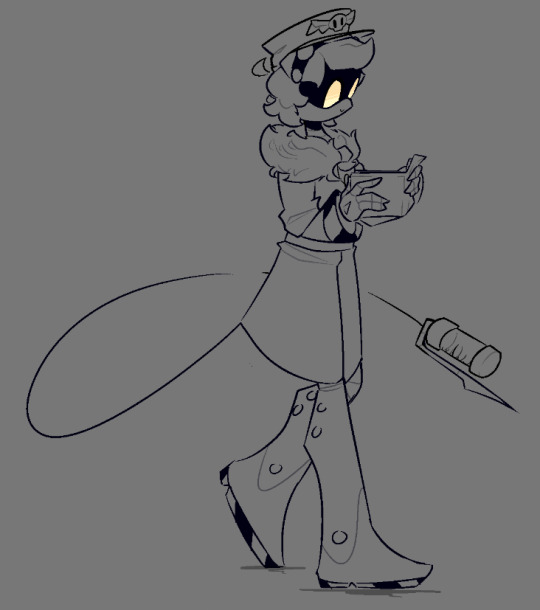
i WILL develop a softer style and simultaneously keep my Sharp Edges and you cannot fucking stop me
#so fucking upset to find out DX was my 100th post#im so tempted to just fucking delete it#somewhat related note i accidentally used the same dark blue for the whole drawing that i used for DX#oopsies#but yea i didn't have a plan for this art it was just Fuck Around and Find Out#im getting slightly better at hands#also stared at the episodes for like half an hour to figure out how to make the tail more accurate#i dont think im ever gonna restylize the legs they're gonna stay like that#murder drones#murder drones n#serial designation n#art#i have a stockpile of ideas thats not the reason i've vanished kinda#its just a lack of motivation to draw and gaining interest in other things#i did learn how to animate models so thats fun
272 notes
·
View notes
Note
heeeey so um idk if you're doing the headcanon stuff but um could you share any yandere lord in black HCs? I'm totally not asking this because I can't find them in our group chats on amino...ok its because I can't find the hcs on our amino groupchats...
Edit; I want to stress that these are PLATONIC headcanons. There is a difference between romantic and platonic yandere. Given that the lords in black are beings coded with childlike qualities, I absolutely do NOT want these being used in a romantic connotation. I am super sorry for not clarifying this earlier. I would never write romantic headcanons for child characters, that's disgusting. I am so sorry.
Sure thing! I need to update them a bit anyway since we know much more about Pokey and Nibbly after NM2.
Content Warning for yandere behavior, murder, death, violence, human-eating, starvation, kidnapping, stalking, mind control, emotional manipulation, and sub-par writing. Also contains spoilers for Nightmare Time 2.
-Okay so you're screwed if any of them grow attached to you.
-The lords in black view humans as pawns, playthings, or a plague, so they're very unlikely to get involved romantically with any humans (thank god), but I can see them gaining a (strictly platonic) fascination with certain humans...
-...And given their lack of morals and terrifying nature, this doesn't bode well for whatever poor souls capture their attention.
-Wiggly will use mental and emotional manipulation to draw his victims in. He's ever the schemer, so he'll make sure to have you wrapped around his finger. Does he HAVE fingers? Tentacles? No, that sounds very wrong.
-He'll make sure you develop a sense of dependency on him. With a mix of clever words and mind manipulation, he'll make it feel as though the world is crashing down. He might influence your peers to be just a little meaner to you, your family a little more judgemental. If he needs to, he'll get you ostracized, shunned, mocked, witch-hunted, fired, abandoned, and/or decieved. He has the power to bring out the absolute worst in people, and he very much plans to do so with everyone you know. To get you to your lowest point.
-But rest assured, your friendy-wend Wiggly will always be there for you.... even though nobody else is. And he has big plans for his new little pawny-wan.
-Tinky is an absolute stalker creep. If he takes an interest in you, whether that means putting you in his bastard box or just plain curiosity, you'll never be alone.
-Unlike Wiggly, Tinky doesn't much care about you being dependent on him. He doesn't even care if you like him. He only wants you to play along with his games, no matter how dangerous or upsetting they may be. Who cares if you're lost to time forever? That your feeble little mind cannot comprehend the horror of his bastard box? That you've lost everything you care about? He's having fun, so you should be having fun as well.
-Ultimately, Tinky doesn't much care what happens to you, he just wants to play. And he's an excellent gamemaster.
-Nibbly I struggle with writing the most, since we ultimately know very little of his motivations other than he's hungry. And I can't very well just have him eat whoever he's yandere for. So take what I say here with a grain of salt.
-Nibbly's motivations are confusing to everyone, even his fellow lords, as he often acts on hungry impulses. While he walks the earth, he may carry you around with him while he feasts on whatever he can find. Whether he's keeping you as an after-dinner-mint or not is hard to decipher. But one thing's for sure, being carried around by a pig-flesh abomination who keeps eating your neighbors, as though you're a stuffed prize won at the honey festival, is not going to be a pleasant experience.
-Luckily, you only have to deal with him for one night each year. So long as he doesn't run out of snacks, and you can stomach seeing a few people get devoured, you should be able to walk out of this (mostly) in tact.
-Blinky is the worst. Let me just outright say that. He's the worst one. He's the most prone to kidnapping his victim, since he has full control over watcherworld. Having you in a controlled environment makes things so much easier.
-Blinky is also the most likely to injure or kill you. His wicked temper is insanely dangerous, meaning you'd have to walk on eggshells around him to avoid being starved, maimed, or straight up unalived. You want to leave? You don't like his park? You're hungry? You want to see your family again? If you keep saying things like that, you'll make Blinky cry... and you do not want to be on the receiving end of that tantrum.
-In Blinky's eyes (all 1000 of them), he sees you as a shiny new toy. A brand new puppy who's tail he keeps yanking. Easy to contain and easy to toss to the side when he's had enough fun.
-Pokey is the least likely to become a yandere, to be honest. They hate voices other than their own, so it's hard to imagine them being fond of anyone. I can, however, see them finding a person who they'd very much like to add to their hivemind first. Possibly someone with the gift or someone connected to the starry children in some way.
-So like... they'll literally steal your free will away as soon as they can. You having a voice of your own is irritating to them, they'd much rather you join their song and dance. If anything, they think they're doing you a favor by doing this.
-To Pokey, you're a trophy, a shiny medal, the first of their collection. And nothing more.
#headcanons#starkid#nightmare time#nightmare time 2#nightmare time 2 spoilers#the lords in black#wiggly#tinky#nibbly#pokey#blinky#yandere#yandere headcanons#the guy who didn't like musicals#black friday#hatchetfield#do with these what you will starkid fandom
28 notes
·
View notes
Text
small vent thing + late night thoughts~ ignore if you wish
mmm its lates and i shouldnt trust these thoughts but i can tell im starting to phase out of drawing twst fanart as heavily as i did into doing oc stuff again and im honestly worried that this blog will just stagnate,,,
i wouldnt be surprised but im a bit dissapointed in myself for not being able to upkeep how well my blog had done when i first started it,,
my interests shift a lot and im happy with the art i managed to make for twst before i fell off that motivation again- with genshin i could barely sketch any of the characters, no matter how much i liked them
its always been a weird thing for me? i found it hard to sketch other peoples designs and feel satisfied with them, but i think that was just an overall lack of satisfaction with my art at the time. i definitely think i can improve in a lot of areas but im a lot happier with my ability in comparison for my age yk? i dont like discussing personal info online (i got it drilled into me that everyone on the internet is bad as a kid and now its just uncomfortable for me to share any personal info,,,) but im taking abt 4 weeks in the summer to do classes in prep for a really important portfolio (you can probably guess what for lmao)
but yeah,,, twst, or just my fanart, might phase out again in favour of drawing oc stuff but god am i just,,, kinda beating myself up over the lack of engagment n stuff with my posts recently yk? and ik my oc stuff wont gain the same traction it would being in a established fandom,,,
nonetheless i cant force myself to draw fanart when i dont want to bc i only make myself feel worse and very frustrated so... expect oc art and hopefully i wont fall off drawing twst bc i do genuinely love these boys and ive never bothered to interact with fandoms before by actually posting content of my own <3 so thank yall for that
1 note
·
View note
Photo

This was really fucking good
This story did a really good job of getting me into Amity’s head throughout its duration. Every little detail, the way that Amity thinks and perceives elements of her environment, it’s all so consistent and mesmerizing. It feels so personal and raw, and by extension allows the reader to both understand and sympathize with Amity to a great extent. I could go into how much more it affected me personally (as a trans woman who didn’t read the tags) when Amity and Luz’s sexual encounter begins, only to realize I could relate to this character on another level I never thought I would, but I feel that just briefly touching on it here is better, as it isn’t an experience the average reader will share. But regardless, the connection that the reader develops with Amity over the course of the story is incredibly intimate. The encounter between Amity and Luz feels good to read, largely because of how we see Amity’s guard go down. The anxiety she has demonstrated throughout the story seems to be largely gone. The narration doesn’t draw attention to background elements because Amity no longer feels the need to pay attention to them. She feels so much more safe and secure now than she has before through the entire story, and you can tell because of just how completely and totally vulnerable she lets herself become. And, by extension, the reader becomes equally vulnerable, emotionally naked. The narration makes you think like Amity, and feel what Amity feels, so when she finally lets her guard down, so do you. You finally come down from being slightly on-edge and acutely aware throughout the entire story. So, just as Amity is betrayed by her siblings in the final passage, so to does the reader feel betrayed by the story itself. It guided you through connecting with this character, feeling and thinking as one, and lulled you into a sense of security, lowering your guard, only to stab you in the back at your most vulnerable moment. It’s a truly unique and amazing experience. Going back, I love how Amity’s anxiety and constant awareness of her surroundings allow the author to drop clues at what is going on throughout the story without making it seem obvious at all. All of the extra details register as simply things Amity notices while highly alert and anxious, so those which are important to the story’s conclusion don’t pop out at all on first pass. Regardless, once the twist occurs, the final few sentences are able to provide just enough breadcrumbs for the reader to easily identify the times this has been foreshadowed throughout the story, thus gaining a better idea of the twins’ motivation and plan. The immersion isn’t broken with an exposition dump, nor does the twist feel unearned through lack of logical buildup and followthrough - the author is able to work around both of these potential issues by simply taking advantage of the same writing style which got the reader so invested in the first place. And thus the story leaves off with a perfect conclusion, offering the reader no idea as to what will happen next, leaving them feeling betrayed and terrified just as Amity does, and refocusing on the internal, personal, emotional side of the story within Amity’s mind before severing the connection and leaving the reader to process everything on their own, just as Amity must now do.
I went to bed one night feeling pretty down about my involvement in fandom, wondering if it was worth it to pour so much energy into fic writing or if I should find other hobbies. I woke up the next morning to what’s basically an analytical essay breaking down and praising one of my fics (including pointing out some things I didn’t even realize I was doing, lol). The comment was wonderful, and so was the timing—it really helped revitalize my interest in writing and in fandom.
Link to the fic
107 notes
·
View notes
Text
Teen girls aren’t allowed to enjoy anything
and here’s my long ass essay about it :)
In youth pop culture, as well as pop culture in general, it’s generally a given that music movies, books, clothing, and other things that gain popularity will eventually fall out of style. On face level, this isn’t always a bad thing, but rather more of a function of society: when something is new, many people are interested, and as time passes, that number dwindles. Backlash and criticism is also a normal function of society, which can be very beneficial when done in good faith and with constructive purpose.
However, it’s quite notable that an overwhelming amount of criticism falls on things that generally have a large fan-following of teenage girls. This can cause them to feel embarrassed by wat they’re interested, or feel that being made fun of is inevitable.
In reality, though, things gain traction for a reason, and things widely loved by teenage girls aren’t often given the same analysis and consideration other things in pop culture are given.
While there is certainly media that isn’t beneficial and could negatively affect young girls, the things they like often go ridiculed by society due to a lack of consideration and deep analysis, as well as the constant sexist want of society to bring down young girls.
Older people in general have been known to blow off things popular in youth culture, which can sometimes be attributed to just not knowing or caring about it. On the more intense side, some are infuriated by it—and not always without reason. But when it comes to things that are popularized by teen girls, a deep and proper analysis is often not given. Instead, they focus on the surface-level negatives.
The Hunger Games is a clear example of this. The series, which revolves around a teen girl forced into a game where she has to murder other kids, is widely condemned as being far too violent and a potential threat to the innocence of young girls.
On the first look, it’s clear that this widespread opinion doesn’t stem from nothing; the series is violent, and mainly young girls read it. However, if one goes even a bit beyond the surface level of the series instead of being initially outraged, it actually shows a complex society and story of revolution with themes of corrupt media and propaganda, separation of class by wealth, and way both sides of a political argument or war can be corrupt.
Take the 12 Districts in the series: the Capital is at the top with the most wealth and ability to abuse, and lowest number Districts are under the illusion that they’re the same. Author Suzanne Collins develops this complex idea in her story by showing that while people in the Districts have different levels of wealth and resources, in the end, they’re all still forced to put their children to death.
In the grand scheme of things, they’re all just as powerless against those at the top. It reflects the nuances of Capitalistic societies and class divisions in a thoughtful way. This can actually really benefit girls, especially since the protagonist is someone they can see themselves as.
A much more widespread example of the ridicule young girls endure for the things they like is fashion. Overall, fashion for girls has progressed in a way that over time has become more diverse and accepting. It’s not uncommon to see girls in long jeans and sweaters, but it it’s also not uncommon to see them in more revealing clothes like crop-tops.
The way girls dress is taken issue with by many adults and even school systems, shown by dress codes that often ban shirts—even if they only reveal a girl’s shoulders. These girls are often told they’re being too provocative or dressing for boys, which strips them of their individuality and is certainly not the case. Many girls dress this way because they want to.
Furthermore, the diverse and growing willingness to be experimental with what they wear shows something wildly different than the harmful predetermination: reclamation of their bodies. Throughout history, girls have been shamed this same way—often more intensely. So, by defying these criticisms, teen girls are showing they feel more free and more confident in what they look like and are perceived as, which is something everyone should want for them.
When things like this are torn down by others, it can affect the girls immense negative ways and cause them to lose confidence. When the benefits are ignored by society, this is often what happens. The positives of more experimental and unique media and styles that interest young girls are at best ignored and at worst ridiculed when not given proper analysis and understanding.
While some criticisms of youth girl pop culture can be attributed to ignorance and lack of poper analysis, it would be even more ignorant to ignore the root of these issues: sexism.
When comparing the things young boys take interest in with what girls of the same age do, one clearly causes more outrage than the other. This can be seen by the blind outrage thrown at things like youth romance novels.
When the young adult romance book Twilight came out, real criticisms of the story were often drowned out by people making fun of its fans, which was majorly young girls. They were ridiculed by people often much older for liking something perceived as stupid. This can discourage girls from allowing themselves to enjoy such things, which is harmful because books like these often give girls hope and bring just pure happiness to them, which is immensely important as they grow up.
Furthermore, young girls are often criticized for liking the same things boys do to a much further extent. Video games, which are often violent, are traditionally played by boys. While these games draw a lot of criticism for aspects of violence and shooting, it has nothing to do with the fact that the audience is boys.
Girls, however, are often personally disparaged from playing such games because they’re too “masculine” and just not made for them. This discourages young girls from finding out what they enjoy and forces them to limit what they take part in.
In the end, even with the hate they often undergo, young girls haven’t stopped boldly and unapologetically enjoying what they love, but it is through their perseverance that they’re able to do so.
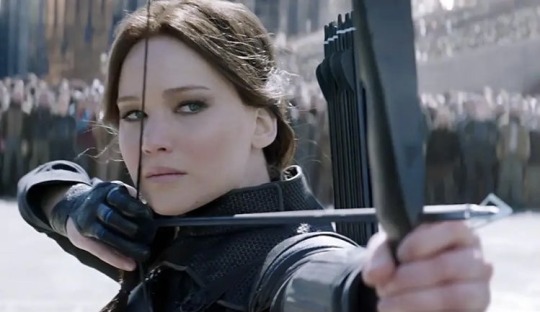
Final note: If we’re being honest, we all have a bit of internalized sexism and judge without thinking about potential effects on others. Sexism won’t cease to exist easily, but if we only take the time to consider our motives—even subconscious ones—we can help stifle our biases and most importantly, create a healthy environment where girls can express themselves.
TL;DR
Society loves to put girls down and make fun of everything they like, which stems from sexism and lack of analysis. In reality, there’s often real, important purpose to the things they enjoy. I also definitely used The Hunger Games and Twilight as examples :)
p.s. i am also in love w katniss<3
#the hunger games#hunger games#writing#team peeta#btw#essay#analysis#katniss everdeen#catching fire#mockingjay#twilight#pop culture#women#feminism#sexism#fandoms#equality#society#modern culture
187 notes
·
View notes
Text
I’ve seen the idea tossed around on here that Darcy and Emma Woodhouse have similar character arcs, and I’d like to expand on that idea. Every female lead from a Jane Austen novel has a male equivalent with a similar personality and plot arc in one of the other books. Don’t believe me? Read on.
Emma Woodhouse & Fitzwilliam Darcy
Both Emma and Darcy were handed all of life’s gifts on a silver platter: looks, money, brains. They were also given a ton of social responsibility at a relatively young age, and with no one to check their worst impulses, they are solely reliant on their own judgement, motivated by good intentions but sometimes screwing up royally. They both fall for the only person who is capable of calling them out on their BS. They both ruin a friend’s chance at happiness in love due to concerns about social class, only to bring the couple back together after learning the error of their ways. Occasionally they come off as haughty, and they have a tendency to say rude things that they don’t really mean without thinking, but they love their family and friends fiercely, and grow immensely as people over the course of their respective novels.
Fanny Price & Edward Ferrars
This isn’t a comparison I’ve heard outside of my own head, but there are so many parallels between these two! They’re both quiet people who have a tendency to fade into the background, overwhelmed by the more dominant personalities of their families, but containing hidden depths and a moral compass of steel. Both are faced with the prospect of marrying an exceptionally wealthy person, and are subject to huge amounts of pressure from their families, only to turn them down. At that point in the narrative, they stand no chance of ever getting to be with the person they love, and risk poverty and ostracism by turning down the rich suitor, and they do it anyway. Not out of any hope of truly finding love, mind you, but because they believe it is the right thing to do, and thus the only thing to be done.
Elizabeth Bennet & Henry Tilney
Both Lizzie and Tilney are mega-extroverts. They love nothing more than to poke fun, both at others and at themselves. They’re the life of the party, the center of attention. Not exceptionally attractive, but you’re too busy laughing to notice. They both cause family falling-outs by rejecting wealth in the hopes of gaining love, and they both have a sweetly-introverted sister who they love more than anything on the face of this planet.
Elinor Dashwood & George Knightley
These two have the same sort of energy: almost a Mom Friend. They’re intensely pragmatic, thinking realistically about finances and the other humdrum realities of life that others refuse to acknowledge. In social situations they fulfill the same part in the dynamic, smoothing over ruffled feathers and putting up with some true absurdities, always the very picture of kindness and propriety. Elinor’s reactions to Anne Steele and the other less-intelligent people she meets at Barton Park read very similarly to how Knightley handles Mrs. Elton. Knightley’s pre-romantic dynamic with Emma is similar to Elinor’s with Marianne, the same sort of exasperated fondness at their best friend who can’t control her impulses and thinks she knows everything.
Marianne Dashwood & Frederick Wentworth
Both Wentworth and Marianne have the same hot-headed force of will, which serves Wentworth so well in the Navy and Marianne so poorly in London drawing rooms. They’re both unlucky in their first loves, thinking things are reciprocated and expecting a ring when there was none forthcoming, due more to familial pressures than to lack of affection by their counterpart. The difference in their fates is due not to them, but to their love interests: Anne is the very definition of constancy and devotion, and Willoughby is... not, to say the least.
Jane Bennet & Colonel Brandon
(For the record, I know the Bingleys aren’t technically protagonists, but I’m including them anyway because I love them, and you can’t tell me not to). Both Jane and the Colonel are painfully reserved, to the point where others underestimate the true depths of their feelings, but just because it’s not obvious doesn’t mean it’s not there. Other people (Willoughby, Darcy) misinterpret this quietness, reading what they want into Jane and CB’s characters to serve their own ends. They’re loved by all in their respective social circles, and everyone in their stories supports their romantic aims, but family scandals, as well as rivals real and imagined, keep the lovers apart until the end of their respective books.
Anne Elliot & Edmund Bertram
They’re both unassuming, introverted middle children of baronets, sandwiched between frivolous, self-important older siblings who spend away the younger sibling’s inheritance, and younger sisters who will do anything for attention. They’re both portrayed by the narrative as being the only person in their family with more sense than vanity, doing their best to set their wayward relatives on better paths. Both make a decision early on regarding their love lives that seemed to be a great idea at the time, only coming back to bite them later (Edmund’s involvement with Mary despite their differing goals/values, Anne’s rejection of Wentworth). They both come to their senses at the end, getting together with the one who had been Admiring Them All Along in the background.
Catherine Morland & Charles Bingley
They’re both giant people pleasers, earnest but naïve and easily lead by others. Whether it’s Darcy telling Bingley not to propose to Jane, or Catherine taking Isabella Thorpe’s abundant bad advice, they both trust their friends wholeheartedly, which leads to some misfortune for them both. Catherine and Bingley are sometimes perceived as less intelligent, but they just lack experience. They come off as younger than their peers, falling in love easily and not worrying much about the greater world and its judgements.
#pride and prejudice#sense and sensibility#northanger abbey#emma#persuasion#emma 2020#mansfield park#jane austen#elinor dashwood#marianne dashwood#colonel brandon#edward ferrars#elizabeth bennet#fitzwilliam darcy#mr darcy#jane bennet#charles bingley#emma woodhouse#mr knightley#fanny price#edmund bertram#anne elliot#captain wentworth#henry tilney#catherine morland#literary#literature#books#classic literature#hot takes
915 notes
·
View notes
Text
His Royal Highness, the Crown Prince of XianLe -- Xie Lian
I wanted to do a little meta for Xie Lian to celebrate his birthday, about why he’s an incredible and unique character! One of my absolute faves. Happy Birthday Lianlian! ヽ(o´∀`)ノ♪♬
(Spoiler Warning!!!)
(Also: massive length warning--get snacks!)

Xie Lian and The Hero’s Journey
One of the most interesting things about Xie Lian is that his personal arc starts near the end. Meaning that he is already nearly fully-realized by the time we meet him in book 1. He has only a few steps left in his classical Hero’s Journey, since TGCF starts in media res. A lot of his growth has been completed--which we witness more first-hand in books 2 and 4--so by the time we meet Xie Lian, he is already endured the most painful of his trials. It leaves him with the traits readers first pick up on: calm, confident, humble, and kind.
The main steps he has left to complete in his journey are the quintessential “atonement with the Father” and his “return home.” These stages of the Hero’s Journey are actually played somewhat straight in TGCF, and the former stage is actually the main plot of the novel. The stages are not meant to be literal, but metaphorical tools for literary analysis, as most books we read employ them in one way or another. TGCF does so as well, just out of order. So Xie Lian’s confrontation with Jun Wu (atonement), then getting his happy ending with Hua Cheng (return home) are the respective stages we see play out in the “present” narrative.
(However, he does have a “call to action stage” nestled within the present-time plotline. One can almost think of this as one Hero’s Journey nestled inside another.)
Xie Lian and The Heaven’s Will
The Heavens shook spectacularly when Xie Lian ascended. Each ascension, the Heavens greeted him with grandeur, even on what he considered his “fluke” of a second. And on his third ascension, the Heavens announced his return in a way that no one had ever seen before--by astonishing all its residents; bringing down the gilded palaces of other gods, and having the ancient clock sound off so fervently that it broke free of its hinges.
There is a lot of symbolism in this alone.
While Xie Lian’s narration (and the reactions of the other heavenly officials, including Ling Wen) paints his third ascension as a mix of comedic and tragic, we can interpret this scene differently. Xie Lian is the only one to have ascended thrice. He is the only one for whom the Heavens shook so powerfully. It isn’t because he’s a disgraced laughing stock--it’s because the Heaven know his true character, and his true strength.
(As an aside--see this post of mine about Heaven as an entity, separate from the Heavenly Capital and gods therein.)
It isn’t a big stretch to conclude that the Heavens show Xie Lian a particular amount of favoritism that it doesn’t to anyone else. One of the explanations for this could be that Xie Lian is the closest thing to the physical representation of the Heaven’s Will™.
This isn’t to say that Xie Lian is perfect. He isn’t, by any means. But he doesn’t have to be. Further thinking of the Heavens along the classic Taoist principles that TGCF draws from, the point is that Xie Lian tries. He works hard with what he has, embraces his fate and destiny, and makes the best of it as much as he can. Xie Lian himself doesn’t set out to be perfect. That is not his goal. His goal is to be a good person who is able to help people. He is morally upright, sincere, and humble. He seeks to maintain balance. These are treasured qualities.
Ultimately, he is human. He makes grievous mistakes, he makes bad decisions, and so on. But at the end of the day, Xie Lian lacks no conviction about his ideology. Even though he endured hell, and very nearly succumbed to darkness, there was always a part of him that held onto that notion that people were worth saving. Even at his worst, he still hesitated before causing harm. And when the man with the bamboo hat helped him--just a single gesture--it was enough for Xie Lian to rediscover that part of himself. His beliefs were re-affirmed, and he found the strength he needed to carry them.
The Heavens did not penalize Xie Lian for needing help. In fact, they rewarded him with ascension itself. When Xie Lian accepted his grief, he began to overcome it. He refused to fall into total despair--and while the actual nature of his second ascension are ambiguous, it’s probable that this is why he ascended. Not because he fought against Bai Wuxiang (because he wasn’t even the one to “win” that battle physically), but because he stood against him in the first place. Xie Lian’s grief, subsequent resolve, and decision to ultimately oppose everything Bai Wuxiang represented--THAT was his Heavenly Tribulation. And he passed with flying colors (much to Jun Wu’s intense fury).
[CONTINUED UNDER CUT DUE TO LENGTH.]
What it fundamentally comes down to, is that Xie Lian chooses to be compassionate. He does so even and especially in the face of adversity. Choosing to be kind when it is the hardest path of all is the mark of true courage and strength. It can’t be said it enough: Xie Lian very consciously makes the choice to do good even when it is hard for him. Even when he doesn’t want to. Because being a good and moral person doesn’t mean that you never have negative thoughts, and for sure Xie Lian gets frustrated and upse. It doesn’t mean you never make mistakes or never hurt people, because Xie Lian has done all those things before as well. After all, he is human, god or not. Things are not black-and-white, and never will be. But staying true to one’s ideals is what matters.
When Xie Lian made the decision to help Yong’An during the drought, for example, he knew it may be futile. He knew that he was breaking rules, going against what everyone else was saying. But he knew in his heart that it was the morally responsible thing to do. He is not the type of person to sit by quietly when there are people in need. He cannot see injustice and despair, and turn a blind eye to it. It also isn’t necessary (or even possible) for him to help literally everyone--as he learns the hard way. But doing what he can, where he can--that’s more than enough for Heaven to favor him. Because that’s the sign of someone who is genuinely compassionate and just.
So it’s no wonder that the Heavens favored him more than others. With a pure heart and strong sense of justice, while still being humble and patient--that’s all the Heavens need.
It’s even ironic that Xie Lian spoke out against the very “Heavens” themselves in book 2, at the height of his pride. But he was actually speaking out against the institution of heaven, and the overly-conservative beliefs that the gods (Heavenly Officials) held. Xie Lian has an extremely non-traditional view of looking at things.
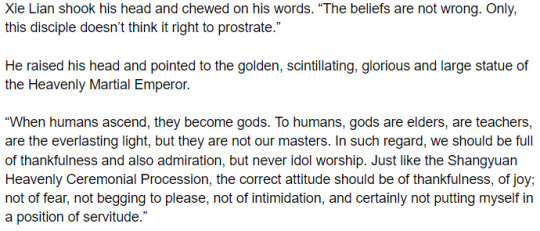
His ideas go against the grain of what has been held true to the people of the world for centuries, but are actually in line with many modern philosophies--that one should not give much importance to idol worship, and instead focus on doing good deeds. That gods, being immortal ascended humans, should display the same humility and temperance; that they not hold themselves in higher regard or expect others to be subservient or fearful. This could very much be in line with what the Heaven’s will actually may be. Why the Heavens favor him so--because Xie Lian understands, in every sense, that gods are only human.
Xie Lian’s Character Growth
“I WON’T CHANGE! EVEN IF IT’S PAINFUL, I WON’T CHANGE. EVEN IF I DIE, I WON’T CHANGE. I WILL NEVER CHANGE!” (ch.239)
That’s the big thing about Xie Lian. It’s what sets him apart from many other characters. From the beginning to the end of his journey, his motivations and beliefs do not change. Only the nature of his motivations, and the basis of his beliefs change. That is to say, he believed that helping others was the right thing to do when he was 17 years old. 800 years later, he still feels this way. It’s just that he approaches the concept differently.
As a teenager, he was naive and coming from a place of high privilege. He was unable to understand the true plights of the common man, and his concepts of helping them--while still noble and morally just--were often somewhat patronizing. His heart was in the right place, but he was simply too young and too sheltered. He also fundamentally overestimated his own capability to help others, while underestimating the negative forces at play that would actively work against him. But 800 years later, Xie Lian has gone through hell and back. He knows better than anyone what it means to struggle, to suffer, to hope, to persevere. He still wants to help the common man, but now it comes from a place of understanding and humility. (The tragedy is, if he were allowed to grow up “normally,” he very much may have grown out of his naiveté and youthful arrogance anyway, after gaining more worldly experience. He was robbed of that chance.)
So Xie Lian chooses to be optimistic about life in general. He knows that he will get hurt by doing this. That people will take advantage of him. He knows, and yet, he continues to hold true to his principles. He neither asks nor expects people to thank him for it, or even understand him (as many people simply don’t). He does it because what other people think or even deserve is not his concern. It comes down to what he believes. That’s just the type of character he is--which is to say: fantastic.

TLDR; Xie Lian Best Boi!!!
#tgcf#tian guan ci fu#heaven offical's blessing#hob#meta#tgcf meta#Sorry had to repost this!#there was an error in the last one's format...#nyerus.txt#its a bit early for lianlian's bday but idk if i'll be able to post tomorrow so here we are#please DM if you see mistakes in this lol
288 notes
·
View notes
Text
in saecula saeculorum // himikiyo week day 3
Himikiyo Week Day 3: Vice + Virtue
"If you’re so against the idea of people getting hurt, you should have thought twice before summoning a demon."
Read on AO3, DRA, or under the cut.
Demons did not exist in the modern world. That was common sense, accepted by nearly everyone save fringe conspiracy theorists and fanatics of all types. Those who would believe in something so patently unscientific, so laughable, would be deemed worthy of ridicule themselves. There was no use for the supernatural when humans had triumphed over the natural world itself.
That was the party line, anyway. It was taught to children in schools, passed on in social interactions and media. Even those curious enough to seek out old tomes and uncover the stories within were motivated to dismiss them as legends. Stories of such things were fascinating, but they were from a less educated time. When people didn’t understand the world around them, they were motivated to devise stories of evil beings to explain their misfortunes.
None of it was real. Humanity’s biggest danger was itself.
Locked in a dusty church basement, one girl felt differently.
“Angie hopes you find the answers you seek, Himiko-chan! Remember though, Kami-sama might just smite you down if you aren’t careful! Even as powerful as he is, he doesn’t take threats lightly.” Setting down a small stack of books and clapping her hands together to brush off the dust, Angie took a step back towards the door. “Oh, and lock up when you’re done, okay? Technically Angie isn’t supposed to leave anyone alone here.”
“Yeah, got it. I’ll be sure to take care of everything.”
“In that case, good night!”
Just like that, she was gone. Himiko stayed where she was and waited until the patter of Angie’s footsteps faded out entirely, leaving only silence behind. It was a little creepy alone in a church at night, she had to admit. Best friend or not, Angie’s religious devotion was unnerving even in the daylight. Himiko was more interested in other aspects of the arcane. Things that wouldn’t be taken so lightly if discovered. For the experiments she wanted to perform, the church basement was safer than her apartment in more ways than one.
Summoning a demon was risky at best.
She already had the proper page marked. The candles were lit. The offerings were nearly ready. The demon — whose name in the book was an illegible scrawl, written in a language Himiko had never seen before — would appear or they wouldn’t. Her years of study had convinced her that these creatures were out there, lurking beyond the boundaries of normal human perception, but if she was wrong, this would be the time for that to be proven too.
Her hand trembled as she flicked the light switch off, plunging the room into dim candlelight.
The shakiness made it more difficult to draw blood, scarlet droplets scattering onto the page she was reading from as much as into the bowl they were meant for.
This was an academic experiment, yes, but it was a deeper part of her that would be devastated if it failed. A part of her that thought someone non-human might provide the kind of companionship and understanding she’d always lacked. Angie was sweet, but she couldn’t honestly say they saw eye to eye.
She carried on with the ritual, occasionally glancing around the darkened room to look for any changes. Nothing.
“Maybe...this isn’t going to work,” Himiko said softly to herself, gaze dropping to her own bloodied arm. “Maybe everyone’s right. If demons exist, we don’t really know how to summon them. Not anymore. They aren’t coming.”
Visually, not a single thing changed after she said that. She was alone. From the emptiness, though, an unknown voice made itself heard.
“Not coming? But I am already here. You humans really are blind.” A whispery chuckle followed those words, seeming to come from everywhere and nowhere at once.
“What? Who said that?” She turned, fumbling for the lights.
“Yumeno Himiko, I have answered your call. It’s been many years since a mortal last pulled me from the depths, but I am, as always, delighted to serve.” Though the voice was disembodied, not providing any visual clues to help her, she could clearly imagine an evil, toothy grin, like a monster waiting for its prey.
Ignoring the stinging pain still shooting up her arm from the ceremonial cut, she finally slammed her hand against the light switch, bathing the room in brightness. The sudden change made her eyes water, but even before she adjusted, she could tell it did nothing to illuminate her new companion’s location.
“Further introductions are in order, aren’t they?” the voice continued. “Demons’ true names tend to be a struggle for such limited creatures to pronounce, so I took the liberty of selecting a human name for myself a few centuries ago. I am Shinguuji Korekiyo.”
Taking a few steps over to the counter, Himiko grabbed the bandage she’d prepared and pressed it to her arm.
“Um, that’s nice, but...would you mind being...visible, Shinguuji-sama?” she asked meekly, being as polite and deferental as she possibly could. It was beginning to occur to her that she might be in over her head.
“Ah. Yes.” Just like that, she was suddenly aware of a presence behind her. Before she could turn to look, she could feel something brushing against the back of her neck. Someone’s nails? They felt sharper than that though, more like claws. A shiver running down her spine, Himiko tensed, feeling unnaturally warm fingertips graze along her pulse point. The heat wasn’t only coming from their hand though. It seemed to radiate from their entire body, like she was standing in front of a fire. Like if she leaned just a little closer, it might devour her.
After a moment, the hand retreated. She turned, and in the half second it took, they were no longer right behind her. Instead, she saw a figure leaning almost lazily against the opposite wall. For the most part, they appeared human. Lanky and incredibly tall, the way they held themself betrayed strength far beyond what their build might suggest. The mask covering most of their face made it impossible to know whether the smile she imagined was truly present, but the sparkle in their eyes suggested it might well be.
“Thank...you...” she croaked, not wanting to say anything that might make this demon — because yes, it was abundantly clear they were one, appearances aside — upset with her.
“Humans can be broken so easily,” Shinguuji mused. “Both physically and mentally. I’d almost forgotten how entertaining it is. Now, tell me, what is it you summoned me for?”
“To prove I could, I guess. That was part of it, anyway. And to learn from you. Studying magic on my own isn’t the same as having a master. And the third reason, I guess, is just...companionship.” Arm nicely wrapped now, she had no excuse to look anywhere but at them, though her face was burning with embarrassment.
“Study? Well, perhaps you’re smarter than you seem choosing me then. I’m partial to research myself. I do hope we can have some fun outside the classroom too, however.” Himiko knew without a doubt then, mask or not. They were definitely grinning, almost leering.
“What kind of fun do you mean?”
Moving closer again, they replied, “Shall we kill together? There must be people you want gone, yes? I can make quick work of them.”
That sent a chill down her spine, canceling out the pleasant remnants of warmth almost immediately. She was no idiot, of course. She understood that demons were violent by nature. But she didn’t call them for anything like that. They...couldn’t insist that she help them get that kind of ‘fun,’ could they?
“What? No. I don’t want to hurt anyone,” she said, pretending she couldn’t hear her own voice shaking. “Sure, there’s people I don’t get along with, but killing? And...besides, should you really be saying things like that in a church?” Himiko didn’t believe, especially not in Angie’s god, but it seemed as good an excuse as any.
“I don’t fear gods,” Shinguuji said dismissively. “They have no power over me. If you’re so against the idea of people getting hurt, you should have thought twice before summoning a demon. My kind isn’t meant to linger in the mortal world for long without reason, and it’s been so many years since I was last given a chance to...sate my appetite.”
“No, we can’t,” she repeated. She could hear the glee in their voice, like they were enjoying not only the prospect of murder, but the experience of winding her up over it. She was probably giving them exactly what they wanted, but she couldn’t help it.
“Well, if you’re so steadfast in your beliefs...I could always kill you instead, yes? We signed no formal contract. I’m under no obligation to keep you safe.”
In that moment, she was acutely aware of everything around her. The occasional flicker and buzz of the fluorescent lights, the musty basement smell of the air, and more than anything, the imposing presence across from her. If they really wanted to kill her, there would be nothing stopping them. But they were just watching her — beautiful, dangerous, and all too satisfied with themself.
Shinguuji laughed, closing the remaining distance between them. A hand cupped her chin, gently guiding her to meet their eyes. They were a brighter, more intense amber than she’d ever seen in a human being.
“Flattering me to keep yourself alive? Well well, that’s one way to go about it. I’m pleased to hear that you find me so beautiful.”
“I didn’t say that!” Their grip, if it could even be called that, was exceedingly light. It wouldn’t be remotely difficult to pull away and avert her eyes, but she didn’t. She was captivated.
“You didn’t need to. You thought about it. So then, what will it be? I have no real need to kill you, not when I can gain energy from you in other ways. And you’re so entertaining besides. If you’d simply allow me to possess you, you would have access to power beyond your wildest dreams.”
“And what’s the catch? There’s no way something that lets you...feed on my energy doesn’t have any negatives.” She chose not to comment on just how close they were now. The warmth of a lithe, not quite human body pressed against her own was oddly comforting.
“There is no catch. However, if it would make you feel better, I’d be willing to write up a formal contract.”
“I’ll look at it then,” she said grudgingly, one of her own arms starting to slip around them in return. “But before that, no weird possession or mind control or anything. And no murder.”
“Mm, I’ll make you fall in love with it yet. Perhaps when we seal our contract with a kiss?”
“We don’t need to do that.”
Shinguuji laughed, once again backing off from the overly intimate invasion of her personal space. “Indeed we don’t. But don’t let it be said that I didn’t offer.”
“Let’s just go home for now. People won’t notice that you’re not human, will they?” Maybe, just maybe, she’d end up taking them up on it.
6 notes
·
View notes
Photo
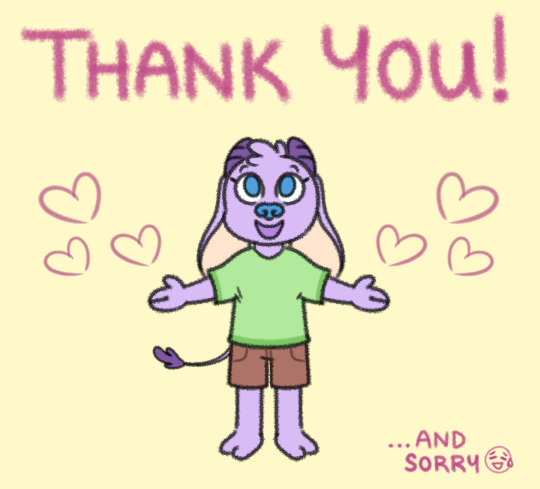
Over the past couple years, my original story Far From Home has gained a very small following. I’ve had the pleasure of chatting with most, if not all, of you who showed interest in the story, and it was through these interactions I learned that other people enjoyed something I created. Having never posted my writing online, I was extremely nervous to share the first FFH snippet back in 2019...but the response completely surprised me. Receiving such kind compliments, encouragement, and even fanart opened my eyes to the fact that I might actually be capable of writing stories worth sharing with the world someday.
It’s been a little less than a year since I posted any FFH content, and I apologize for that. But to those who still enjoy my story and its characters - this is for you. Thank you for sticking around, taking time to read my work, and finding a place in your heart for my little misfit alien family. Your support truly means more than you know!
If you’d like to learn more about the story’s current status and future updates, see below.
Development for FFH has been very slow over the past year. I’m currently enrolled in graduate school as I pursue a career in cytotechnology, so it’s not often I have time to sit down and think about the story. On the off chance I do have time, I usually just collapse from exhaustion or do something that doesn’t require much brain power. This academic program is very difficult and demands much of my available time and energy.
To make things more inconvenient, the lasting nature of the pandemic has negatively affected my mental health. I’m struggling in a lot of areas, especially when it comes to motivation for creative endeavors. There’s only so much I can do before I feel worn out or grow frustrated with my work. And self-deprecating thoughts certainly don’t help, as they often deter me from writing.
So hopefully this small glimpse into the hectic life of a tired grad student is enough to explain the lack of FFH content :’)
In terms of future updates...I’ve thought about it a lot and have decided that I will no longer be posting new Far From Home written pieces in the future. There’s still one scenario I’d like to write about/share, since the idea is cute and it provides a more in-depth understanding of the characters’ relationships (and I’ve been sitting on the rough outline for a while now). But although writing these snippets is fun, they’re ultimately distracting me from planning, preparing, and writing the actual story. There’s still so much world building to do, so many characters to create and develop, so many plots to refine. I recognize that FFH is not complete by any means and I want to take small steps toward producing something that is. Because if my goal is to publish a trilogy someday, I need to acknowledge the fact that this story won’t finish itself.
This doesn’t mean you’ll never read about Baz, Toko, or Gerdie again! Questions/comments about the characters are always welcome, and I’d be ecstatic to do another one of those character ask memes if people are interested in that sort of thing. Plus, even though it’s been a long time since I’ve drawn my alien kids, I still intend to post any drawings here (and any sketches on my doodle blog). What this does mean is that maybe, just maybe, someday these characters will be featured in a full-length novel. And if not, maybe you’ll see them somewhere else. Who knows :>
But if you made it this far, thank you for taking the time to read this. These characters and this story mean a lot to me, as do the people who care about what I create. Your kindness and support don’t go unnoticed.
#my art#Far From Home#Toko#also Tired Penguin if you're out there#even though you don't have a tumblr account#I hope you know how much I appreciate your asks and drawings and all the ways you've supported FFH <3
36 notes
·
View notes
Text
Hannibal Episode-by-Episode Meta/Analysis: Episode 3, Season 1 (Potage)
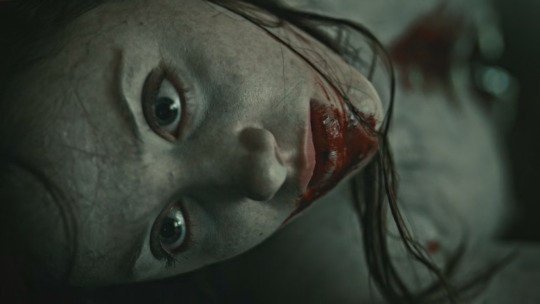
The first scene of the episode takes us back to Abigail’s memories of hunting with her dad. That whole memory provides us with a brand-new aspect to who Abigail is what Hannibal might see in her. Suddenly, it makes us question if Hannibal saw her as something more than a tool to draw Will in. Afterall, Hannibal’s philosophy would not sound too strange or bizarre to Abigail than what she already is accustomed to. She grew up being taught to normalize killing and eating what she kills with maybe different reasons than Hannibal, but obviously she still is the most fitting instrument to whatever he is planning.
Alana comes to Will’s house to talk about Abigail’s waking up from the coma and when Will expresses his concerns for Abigail’s being left alone, she says “Dogs keep a promise a person can’t”. And Will replies it with “I am not collecting another stray”. While she is trying to warn Will before he makes a huge commitment he probably cannot keep, because of guilt; she compares Will to a dog and Will compares Abigail to one. In the previous episode’s article I had already expressed my thoughts about Will’s relationship with dogs and how I think it represents his animalistic, urge-full side. So I find this set of metaphors to be a touch-on to Abigail’s yet-hidden killer side and Will’s subconscious recognition and acceptance of that, along with his own.
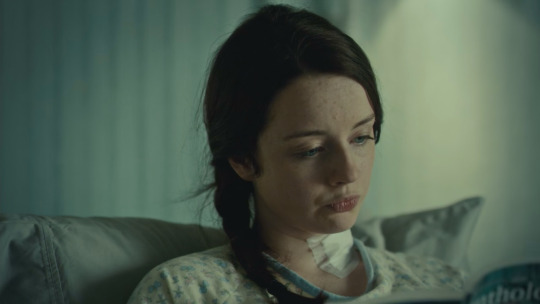
The conversation of Alana and Abigail is pretty informing about who Abigail is. When Alana walks into room and says that she is a psychiatrist, Abigail’s curious, if not tactical, question of what kind? and Alana’s saying family trauma (and not, for example, criminal something), ends up Abigail’s facial expressions to suddenly change into one that looks victimized. I do not believe it was an emotional transaction, I think it was one on purpose. As Alana later will say, Abigail shows enough-to-be-considered-healthy emotion about her parents’ deaths but also enough detachment from what happened to falsely suggest a lack of connection on her behalf. Her jumping from the topic of her parents’ being dead and her dad being a serial killer to making plans about college is not a mere denial caused by being traumatized but also a strategical move that someone of guilt would do. Her lying to nurses and trying to analyze Dr. Bloom is not a very victim-like behavior, she manipulates and tries to establish a position of dominance. I am this close to almost suggesting that this is something Hannibal would do. Hannibal made a fantastic move, bringing Abigail into the equation. (Abigail’s yet-to-come talk with Freddie is another example to what this paragraph is telling too.)
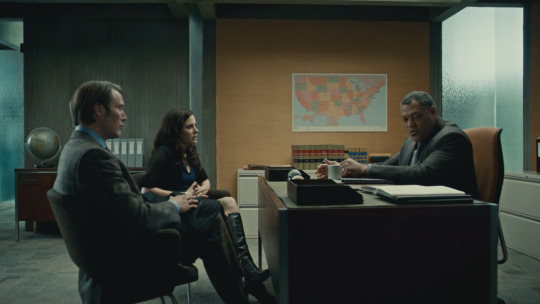
When Jack, Alana and Hannibal come into the same room together; everybody’s priority is different. Jack wants the case to resolve at all costs (at the cost of Will’s or Abigail’s stability), Alana wants the best for Abigail and Will, protecting their mental health and Hannibal wants neither. He wants the case to stay unresolved or resolved in a way he is pleased, and he wants both Will and Abigail in a position that is furthest from being stable. Actually in his thinking, he does want the best for them. Afterall, that is how Hannibal operates. He wants people pushed to their darkest potential, to unleash their beast, in whatever form it may come. He does that by increasing chaos around him and he feeds on that chaos. He sets things into motion to ends that even he sometimes does not know what of. So of course, he will agree with anything that stirs up the pot, which is right now Will and Abigail coming together.
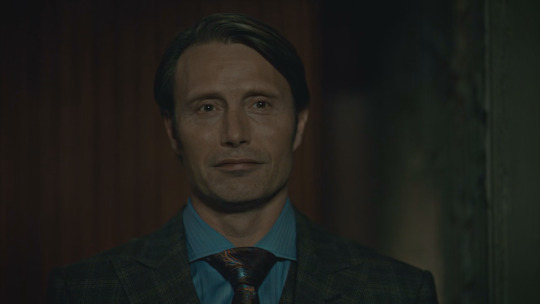
Hannibal and Jack walks into classroom when Will is giving a lecture about the Copycat Killer. While doing so, he describes the killer in detail and to our knowledge, quite accurately so too. Hannibal seems to be listening to him intrigued and almost fascinated at Will’s deductions about the killer since they are so right and his smile reaches its max (well… max at Hannibal standards) when Will points out that the unidentified caller is in fact, the Copycat Killer. He is not just enjoying the thrill to be discussed as a killer in the same classroom he is standing in, without a soul knowing; what he enjoys the most is Will’s closing in. His spot-on deductions on what kind of person the killer is. Maybe this is the first time Hannibal hears someone speaking about the real version of him who is not wearing a person suit and doing that quite accurately too. Will is getting to know him, real him, and Hannibal enjoys it.
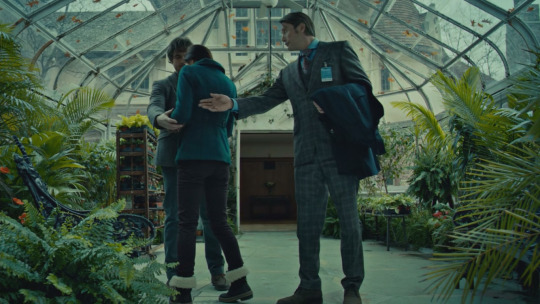
Will and Hannibal take Abigail for a walk in the greenhouse, Will supporting Abigail’s arm with his own. There is a one-second scene where Hannibal also touches Abigail’s arm (but that is all it is, a very no purpose-serving touch) to try and help her sit just like Will does and looks at Will, almost hoping to find appreciation or approval, which makes me smile.
During the conversation of Will and Abigail, the camera focuses on Hannibal only right after Abigail says, “That’s not all I brought out in him”. Up until then, Hannibal seems almost bored with their conversation about her mom. But that sentence makes something in him move, suggesting that he may be hoping Abigail to bring out something in Will too. Maybe that something being protective feelings against her which can be manipulated to familiarize Will with normalization of crime. Abigail continues to express her concerns about being messed up and having nightmares. But Hannibal only says “We will help with the nightmares.”, so they will not with her being messed up part? Well, why on earth would he? That is exactly how Hannibal wants her, messed up as others would say, or perfect as Hannibal would. Then, Abigail finally asks a question to Will that intrigues Hannibal the most, “Does killing somebody…feel that bad?”. Hannibal almost holds his breath waiting for Will’s reply. In return, Will gives a very interesting answer. He does not say yes it does, he does not confirm. He says, instead, that it is the ugliest thing in the world. He maybe right, but ugliness is not equal to badness, is it? Ugliness is a measure of visual taste, not a measure of morality. He almost suggests, killing may be an ugly act, but does not necessarily feel bad.
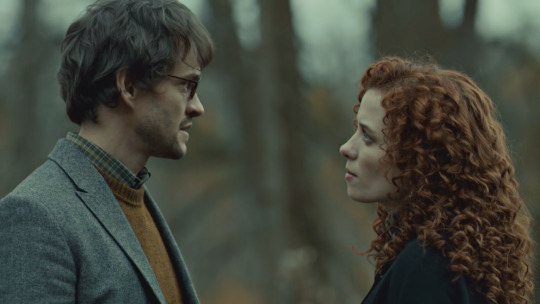
“It is not very smart to piss off a guy who thinks of killing people for a living.”
says Will to Freddie, in response to her threats about badmouthing him to Abigail. Obviously, Abigail already became family for Will. He protects her and shows a very different face of his when his relationship with Abigail is threatened to get compromised. A face that Hannibal loves seeing Will with. So when Jack asks Hannibal why he let Will say those words, Hannibal gives some Hannibalistic answer while smirking in a very non-subtle way. Of course, he would not stop Will in one of those rare times that he reveals his inner demons, Hannibal counts on it, even.
The second time Alana and Hannibal have different opinions (the first time was about Will going to see Abigail) is about if it is right for Abigail to visit her home where all the crime happened. While Alana disagrees with the idea on an attempt of saving Abigail from possible trauma, Jack chooses to go with Hannibal’s idea which is that confronting everything that happened in her home could be healing for Abigail. Jack is so blinded by his professional ambition to figure out everything hastily that he does not even realize how much damage he is causing unknowingly by each time not taking Alana’s professional opinion over Hannibal’s, whose motive actually is the opposite of Jack’s.
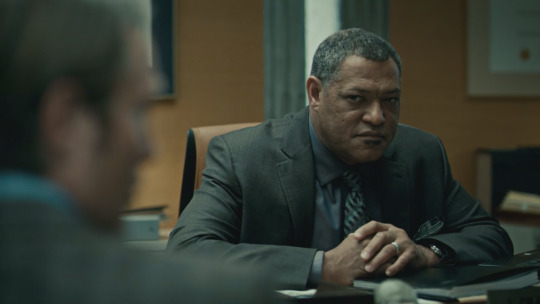
I think right about here is a good place to express my thoughts about Hannibal’s effect vs Jack’s effect on Will/Abigail. Although Hannibal is supposed to be the so-called ‘villian’ in this show, the serial killer, the cannibal, the person who drives people’s minds off the edge, the person standing opposite of law enforcement; he has a moral code. A code that is very different from the consensus but nevertheless, a code. And all the mind games he plays with Will and Abigail are meant to serve a purpose of helping them achieving their highest selves. Not forcefully making them into someone they are not, not harming them of out nowhere, but watering the seed of whatever it is inside them. To his thinking, he is elevating them. Helping them. On the contrary, Jack being one of the good guys in the show, the FBI director, the voice of justice; he manipulates and uses Will and Abigail never having their best interest in his mind. The only thing he cares about is the crimes and criminals; and everyone else’s stability and sanity, if lost on the way, is considered collateral damage. Unlike Hannibal, he does what he does to Will and Abigail knowing that it might end up harming them. So it is open to discussion, if Jack’s morality is any better than Hannibal’s. Or if his even is half consistent as Hannibal’s. I will come back to that in the coming episodes.
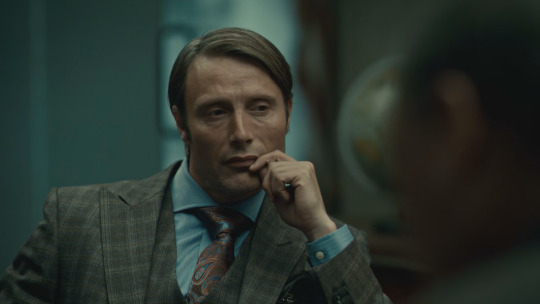
While still in the office and the four are talking, we learn that Jack’s motivation to take Abigail home is about gaining information about the Copycat. That is probably when the wheels started turning in Hannibal’s head about diverting FBI. Hannibal’s acts are never well-planned or calculated until the moment of actually killing someone. Although he is spotless on his murders, he rolls the dice and works with the material he is given on the events that lead up to those murders. Yes, he has one great big plan that consists of bloodshed, severed limps and a few people on specific positions; but he does not have one definite way to reach that. He goes with the flow placing the pieces into their places, which is what makes him that exciting: His unpredictability.
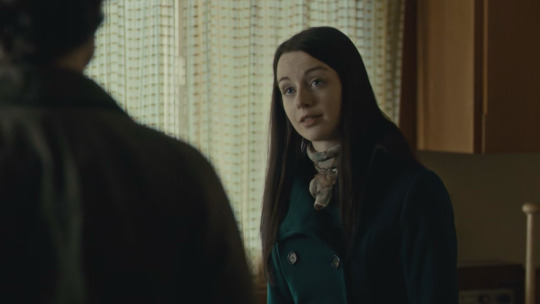
The short conversation happening between Will and Abigail about Will’s empathizing and his putting himself in her father’s shoes are seemingly pleasing for Hannibal. Afterall, more bonded they become, greater the chance of Will protecting her on all costs and consequently that cost being slipping away from the light side into Hannibal’s lap (sigh). When the topic of why they came there (to find out about the man who called the house that morning) comes up and Will asks her about the caller, she throws a very quick glance at Hannibal while saying that she did not recognize the caller’s voice, which suggests that it is a lie. Hannibal looks a little surprised, either for the fact that she remembered his voice, or that she did and did not blurt it out. Considering Hannibal’s thick accent, it is unlikely that someone would not recognize it after hearing it. So the second option weighs more heavily, just as her suggesting Hannibal being the man on the phone on a reenactment proves it so.
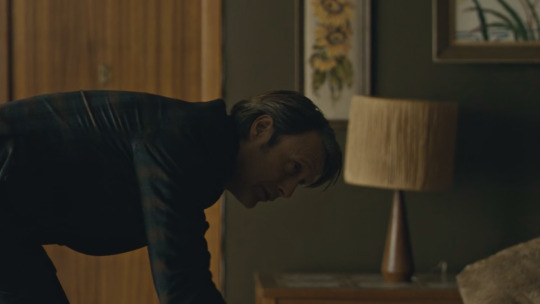
“One cannot be delusional if the belief in question is accepted as ordinary by others in that person’s culture or subculture. Or family.”
says Hannibal and it says a lot. Is not this the very thing Hannibal is trying to do? Putting together a family where his beliefs will be accepted as ordinary? Providing the same freedom to other members of his family as well? Making a family to set them all free, along with himself?
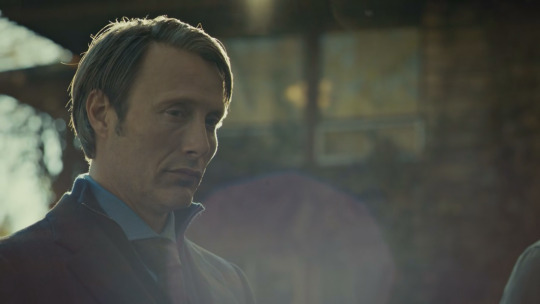
When Marissa shows up and somewhere in between the events calls her mom a bitch, considering the look Hannibal gave her (a very similar look he had given to Franklyn after he blew his nose and placed the dirty napkin on the table), her death was expected. The combination of that and finding the stone stained with Nicholas Boyle’s blood would be an obvious one-stone-two-bird solution to Hannibal’s diverting FBI from the Copycat Killer plan.
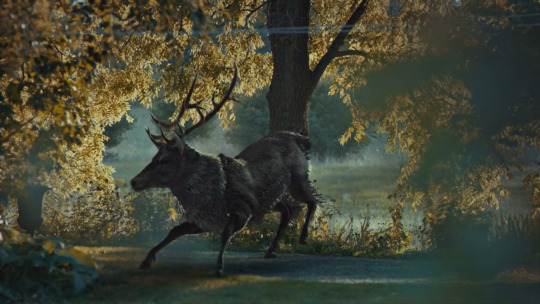
The second time Will dreams about the stag is at least as illuminating as the first one. He dreams about the stag right after the Copycat Killer kills someone. The first time, he saw it after Hannibal killed Cassie Boyle. And this time, we will learn that he sees it after Marissa was killed. I do not think that is a coincidence. This time though, as a difference, Will sees himself as the stag getting into a defensive position against Abigail’s throat being cut, again by himself. So he has no way out, either he is the guy killing Abigail or he is the stag who we already know is a killer, although is in defense right now. This almost suggests that deep down he knows regardless of the path chosen, there is no escape from blood. There is only a lesser evil, maybe, and that is killing to save. And the stag is the representative of this lesser evil in the dream, which is interesting because well, we know the stag will turn into Hannibal. Almost to suggest that, Hannibal’s true evil self without the person suit and Will’s maybe acceptable lesser evil sides will be one, to complete one another. (I may be reaching with that one…)
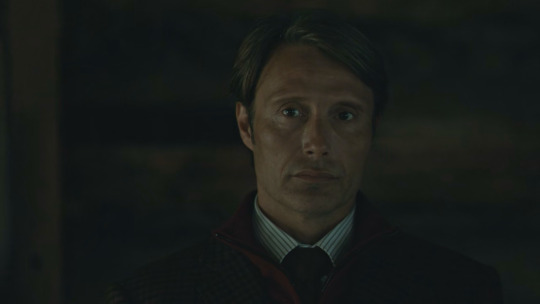
When Alana, Abigail, Will and Hannibal reach to cabin; the look on Hannibal’s face when Will asks Abigail if there is anyone else beside her and her dad who has been to the cabin and she says no, suggests that it is not true, although she is not aware of it and it also suggests that the plan of Hannibal is put into motion. In a little while, he also loudly accuses of Nicholas to kill his sister and Marissa, suggesting he is the Copycat Killer.
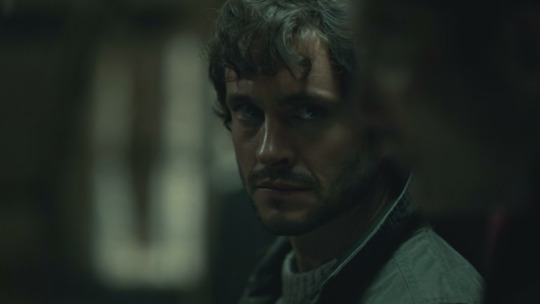
While Hannibal is making remarks about this killer not being Garret Jacob Hobbs because of leaving a body behind and not eating all of it, Will gives him a little disturbed look. Either because Hannibal looks too certain speaking, or because deep down, Will is smelling something suspicious. He actually gave a very similar look to Hannibal when he came into his classroom in between his lecture about the Copycat Killer. I do not think it is a coincidence, but it is very arguable to what degree Will’s awareness was at that point, even on a subconscious level. (There is another possibility that Will’s looks at Hannibal are just/also because he finds Hannibal glamorous with the way he thinks and everything ;)) )
Hannibal, hearing Freddie talk about someone else lurking around the house, asks her if she saw Nicholas. So we conclude that by putting the blame on Nicholas, what Hannibal hopes to achieve is to draw him out to the house to talk to Abigail to clear his name and… Well, there is no “and”. That is probably as far as his plan went and Hannibal did not know that Abigail would kill Nicholas but we can say he hoped she would. Creating a bond (preferably) and/or leverage (that can be used if Abigail did not turn out to be compliant) between them perfectly.
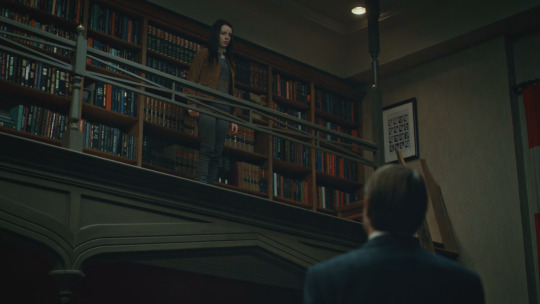
After Abigail escapes from the hospital and comes to Hannibal’s office, in between the conversation Hannibal says, you climbed over the wall, which means, apart from its literal meaning, that after she killed Nicholas, she is now free. By killing him, she broke her restraints and now in new territory. Then, he tells her to come down from there, suggesting after climbing over the wall, what you do is to come down, where Hannibal is also standing. Meaning, Hannibal also had climbed over the wall and now they are at the same side, so she can relax. This is the family where the belief is accepted as ordinary.
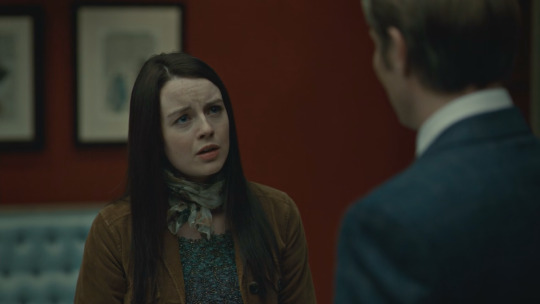
While Hannibal convinced her that if she did not hide the body, nobody would believe her innocence right after she killed Nicholas, insinuating she had no choice but to ask for Hannibal’s help; now that it is all over, he tells her that most people actually would believe that she was innocent. Abigail who understands that she has been manipulated, puts the pieces together and reveals that she did know Hannibal was the one who called the house. Not trusting her enough yet, Hannibal does not deny what she is saying so that she would feel let in, but not so much to let her in all the way either, creating a balanced relationship dynamic (of course, in the eyes of Abigail) between them. Then, by saying “No more climbing walls, Abigail, he makes sure she understands they are in the same side now, as equals (he lets she thinks) and there is no going back.
#hannibal#hannibal lecter#will#will graham#hannibal and will#hannigram#brian fuller#nbc hannibal#hannibal meta#hannibal analysis#will and hannibal#mads mikkelsen#hugh dancy#murder husbands#abigail hobbs#will loves hannibal#hannibal loves will#potage
31 notes
·
View notes
Text
Dave? Dave.
It's been quite a bit since I've written anything here, huh? Well, I guess as it has been for pretty much everyone, life has been kinda strange for a while now. Despite vaccine roll-outs and continually changing safety regulations, there's still a global pandemic on, and everyone is trying to navigate this reality the best they can. For once, we are all, generally speaking, in the same boat now (sure, there are huge differences between countries because capitalism fucking sucks and rich greedy humans are once again proof that things need to change asap, but overall, we all have to deal with this pandemic).
But I don't actually want to talk about the pandemic, it just exists as a frame of what I do wanna talk about.
As I have mentioned before, when the pandemic hit, I was in the last semester of my undergrad studies and writing my Bachelor thesis. Or that's what I was supposed to do, anyway. I did do a lot of reading for it, early in the first lockdown after university closed and we were all attending from home. I was lucky, I had no classes, I only had like three scheduled meetings to check in on progress of the thesis, but otherwise I was free of zoom calls and attempting to attend university digitally. So I read.
After a while, reading became taking a book with me into the sun, glancing at one or two pages, and then just napping for most of the day, and spending my evenings either playing video games or watching some tv show or movie. At some point, I felt like now was the perfect time to rewatch all fifteen seasons of CRIMINAL MINDS, so I did that, instead of writing my thesis. I still occasionally read, but most of the days I just felt exhausted and unmotivated so I stayed in bed and binged my crime show.
As the deadline for the thesis started approaching, and the time I had left fell under a month, a switch in my brain seemed to be activated and, oh, hello, suddenly there was a certain drive there for that thesis again. Which lasted exactly until an email from university dinged into my inbox a few days later, informing me that I would get another month for my thesis, due to the pandemic. And away that motivation and drive went, immediately.
Not much later I had a session with the therapist I was seeing at the time, because of the hormone treatment I had started early that same year. I had talked to him about my concern that I might have ADHD before because I didn't feel like there was anything we needed to talk about related to my transition, so I brought it up again here. I told him how my thesis was going -- or rather, how it wasn't going at all -- and finally, as I told him about some of the issues I experienced while trying to do work for it, he acknowledged that I may indeed have some attention regulation issues. He prescribed me medication to try out, and -- wonder oh wonder -- suddenly I was writing my thesis. I ended up finishing it on time (even though a week before I had a moment of "all of this is garbage, I will never pass, I should start the whole thing from scratch") and got a decent grade for it, too. I've been on those meds since.
Over the last, I don't know how many years, I've always known that there was something a bit wonky about my brain. There were always these things that seemed to come so easy to other people, and try as I might, I just couldn't make them happen. I, presumably, had a lot of neurotypical friends. I also have friends with depression, BPD, anxiety disorders and other neurodivergencies. I have family members with autism. I know my mom suspected I might be on that spectrum as well.
Reading up on many of those things I never felt like any of them described what I was experiencing. There were certain traits, sure, but mostly there was a lack of what I actually did experience in most of them. Even ADHD, when reading about the "required" issues and traits, doing those self-diagnosing questionnaires, I just never saw what I felt represented. And then I started reading about what people with diagnosed ADHD had to say about how they experience things. I ignored the more medical or clinical information, and just looked for people talking about how they navigate their lives with ADHD. And then all of a sudden it was, oh, yeah this, this is relatable. This is where my brain's at.
Suddenly it made sense that caffeine didn't do nothing for me, that a nice, warm cup of coffee put me right to sleep. It made sense how, after only a month, suddenly a well beloved hobby or tv show was suddenly of no interest whatsoever. Staring at the wall for three hours instead of doing a simple task. Drawing in class so that I could pay attention to what is being said. The inability to remember much of my life before 6th grade. Having to bounce my leg so I could read a simple text. Needing to visually break a book down into chapters with colourful post-its to keep me from being overwhelmed by the length of the book. And so many other things. Suddenly, there was a reason for that.
I've always liked doing personality quizzes. Or doing stuff related to my zodiac sign even if I don't believe in astrology per se. Finding out what my Enneagram number is. Or my Myers-Briggs type. Not because I think those things define me or describe me to a T, but because they give me a vocabulary. They give me options. I love answering a bunch of questions and then getting a wall of text telling me This Is Who You Are and then I get to pick out what is accurate and what isn't. It gives me words to describe who I am that I didn't have before.
And it is the same thing with posts or videos of people with ADHD. It gives me a vocabulary for the things I experience and it lets me express those things in a way I wasn't able to before. Before, I was like, doing things that my brain doesn't want to do, feels like running headfirst into a wall because there is no way above, around, or underneath it. There is no door, no ladder, no tunnel, no nothing. There is only running headfirst into it until maybe, hopefully, it cracks. Preferably before my head does. But that is exhausting and most of the time, I prefer to not get through the wall at all, if what it takes is going headfirst through it. Now, I know that what that is, is a dopamine deficiency. The task that needs doing, the task that this wall is, doesn't give my brain enough dopamine. There is no satisfaction, there is nothing to gain from that task, so the brain isn't interested.
One of the things that I recently discovered and helps me a lot in this quest of figuring out how my brain works, is this guy Connor on tiktok, who also has ADHD. His videos are both hilarious and informative. And also incredibly relatable. They might be silly haha funny videos on the dear old internet, but I walk away from most of them going, oh! oh that makes sense, good to know.
He occasionally talks about how ADHD is completely misnamed and how Attention Deficit Hyperactivity Disorder does not actually accurately describe what exactly people with ADHD lack. In one of his videos, he calls it DAVE instead. It's silly, and sounds a bit dumb, but I kinda like it. Dave. Dopamine Attention Variability Executive-Disfunction. Dave. I like Dave.
Y'know, I don't mind having ADHD. Presumably, I've lived with it my whole life so far. And it's annoying as shit some of the time. Especially when things need to get done and they just won't. But I don't mind that, especially now that I know that this is what it is. I've always feared that if I finally do go to a therapist and try to figure out what my brain is up to, they'll just tell me that I'm fine and there's nothing to worry about. And at first, my therapist did say I was psychologically unremarkable. But I guess if you've lived like this your whole life and nobody has really picked up on it, even a therapist doesn't notice (it's called masking, I've learned, thanks Connor).
But knowing is good. Knowing means I can learn things that help. I can take medication when needed. And, looking at the grades I'm currently getting in my graduate studies? Hells yeah, taking that medication and knowing how to deal with certain aspects of my brain helps a lot. It is incredibly funny to me that the best grades I have gotten in my entire academic career have been achieved in my Master's studies during a global pandemic. There is currently an actual real possibility that I may graduate summa cum laude. In my MA. That is insane!
Anyway, I am avoiding tasks by writing this right now. Oh, the irony. I'm gonna try and do those tasks now. Y'all take care. Cheers!
9 notes
·
View notes
Text
Ninth House In the Signs
Aries-
When the ninth house is in the sign of Aries, a person can be too passionate about their beliefs, not allowing others to express their system of convictions. Fighters for religion, ethical approach, college, or their own progress of any kind are seen here. In general, this is a strong position that finds energy in the future and draws a person towards positive change. However, any ties to the past will make their dreamland vivid and blur the direction they are supposed to follow. Once they feel they are on the right path, with a mission to accomplish and deep beliefs leading forward, these are the exact people who will learn about boundaries, conflict, and fiercely achieve any goal they set out to reach. They tend to find purpose only in things they are truly passionate about and wither in any circumstances that don’t invigorate them and make them feel alive. They need their talents put to use and the fire in their stomach constantly burning in order to live a long, creative and healthy existence.
Taurus-
If the ninth house is set in Taurus, the purpose of a person’s life is always found somewhere in the material world. Experience needs to be built in the real world, through financial and physical matters, and this is the exact reason why these individuals turn to education in fields of finance, agriculture, cooking, or real estate. For as long as they don’t lack initiative and primal energy, they can truly be fantastic in practical issues, but also tend to close up for new experiences if they get hurt or disappointed. This is a tricky position for as much as the beneficent sign of Taurus can be mellow it can also be lazy, static, or stiff to accept change and the beauty of constant movement. There is a special joy these people find in tradition if their Venus is beneficently set, and they will strive to reach family values and practical pleasures as much as they can in this lifetime.
Gemini-
The ninth house in Gemini leads to growth through communication. These individuals will learn new things quickly and with passion, while at the same time having trouble holding on to large chunks of knowledge or finding synthesis for everything they’ve learned. To mend the troubles found in overthinking, they need to also learn to stay concise and focused on one point at a time. If they have too many goals at once, they will rarely manage to reach any of them, and the most important thing the ninth house in Gemini has to teach, is how one should think and use their words. If they find true emotional intimacy, it will usually give them a strong basis to improve their approach and help them thrive in fields of oratory skills, public exposure, trade, and information technology.
Cancer-
With the ninth house in Cancer, there is always a simple striving held in a person’s path – to find peace. This is not an easy mission for someone with their mind standing in the way, for our human nature often doesn’t allow enough silence and peace to reach that much needed state of clarity and peace. A strong purpose is always in connection with family issues that have to be resolved or gained through their own ability to form calm relationships with their partner and children. Very often, this position will point to the possibility of life abroad, in case it is confirmed with at least two more significations in the chart. Their greatest teachers are found in their own heart and they will come to see that only people they love can actually teach them anything at all. This will lead to some hurtful emotional experiences for the purpose of each feeling they have might be to teach, rather than last or provide them with that much needed peace.
Leo-
When the ninth house is set in the sign of Leo, we see that someone has to clarify the image of self apart from their family, upbringing and values taught at home. If they are too proud to accept that truth is relative to all people, they can become pushy and force their opinions and convictions on everyone around them. The key to a healthy existence here is often hidden in their chase for emotional satisfaction and the Moon will speak of their ability to forgive, move forward, and accept their feelings instead of trying too hard to remain in a rational mode. Awareness will grow as soon as they realize how vulnerable they actually are, face the fact that they are human and that their emotional core gives them much more benefits than weaknesses. They will learn from dominant figures, their boss and their father, but rarely have enough respect for the feminine side within to achieve their incredible full potential.
Virgo-
The ninth house in Virgo speaks of the focus on helping others, charity work, and matters of modesty and detail. Those who were born with this house position often have the need to learn how to heal and rationally understand the intelligence of their physiology and practical issues in the material world. However, their ego stands in their way and they will always have a challenge of their Sun to overcome to truly reach the state of wisdom and purpose. Something is always used and needs fixing in Virgo, and it is quite common for these individuals to have problems while traveling for choosing accommodation that is too cheap to be enjoyed, or overpaid for the one they get. They will have a flare for literature and many linguists and writers will have this position accented, if their tenth house supports strong materialization of everything they have learned.
Libra-
If the ninth house is set in Libra, there is something strangely confusing in a person’s belief system, the main problem being the fact that their beliefs seem to be defined by other people. They will find many role models in this lifetime and need to overcome their self-criticism in order to truly reach their desired state of mind, physical state, or professional goals that they see as their calling. Hard work is needed for their plans to materialize and they will often be stuck in their dreamland, or when disappointed too many times, in their world of envy and feelings of incompetence. Relationships with quality will have to stand the test of time, and it is very often that these individuals remarry, sometimes only to find that marriage is too serious for them in the first place. When well supported, they will blossom in areas such as law, diplomacy, marriage counseling, and all activities done with a partner or someone they have an emotional bond with.
Scorpio-
With the ninth house in Scorpio, we have to understand that a person will make choices that many would think of as strange. In the most positive manifestation, this will give one an incredible depth of mind, belief in the power of planet Earth, connection to endless pools of inner energy and a tendency to study science, psychology, or even occult teachings. Still, we have to keep in mind that practically speaking, these individuals have a belief system rooted somewhere in the river of their ancestors, highly unconscious and strange for many people around them. Their convictions will be powerful and obvious in their manifestations, while their need to learn about deep matters that others don’t want to deal with often sets them apart from their group at school, college, or at any family gathering. They have to find a way to satisfy their inner craving for deep understanding of the Universe and Unity, but they will find it only if they mend their broken relationships and realize that no man is born into this world to be alone.
Sagittarius-
The ninth house in the sign of Sagittarius speaks of a higher mind, in a way, and shows one’s need to travel, learn, and widen their horizons as much as possible. The trouble with this position is held in the inability to go deep enough to actually ground ideas and entire mental belief systems. Even though these people can be incredible teachers, attorneys, gurus, or motivational speakers, they will often have trouble accepting change as a necessary tool for improvement. Sticking to their moral convictions without a doubt in their mind, they will forget that change is the only thing that will truly help them regenerate. Aiming high, they don’t have a clear idea of everything going on at planet Earth’s surface and need a reality check from time to time, just to remember that distances are there to be crossed, not just to be observed.
Capricorn-
If one’s ninth house is set in the sign of Capricorn, their beliefs can be annoyingly stiff. It will be very hard for them to make a change in pace or direction once they set out to do something. Their main problem is hidden in the real purpose of all things in their lives. This is why they sometimes have to exchange their practicality and common sense for a dream or two. The main objective with this position is to achieve a state of acceptance that allows these individuals not to push their convictions on everyone around them. There will be an ease in learning about ancient teachings, history, substance, and mathematics if their Saturn is well set in a sign that gives it dignity. However, responsibility they need to take seems to be too distant for them to reach its understanding. Once they do, they will finally have a chance to create a solid foundation for their future endeavors.
Aquarius-
With the ninth house in Aquarius, one’s striving and desires are never ordinary. Learning through symbols will be as easy as it gets, which makes these people turned to astrology, mathematics and programming. The problem will arise when a person with this ninth house doesn’t feel the need to accept responsibility for their own life. A truly disappointing thing here hides in the fact that their routine is shattered enough to make them too tired to learn everything that interests them. This great mind will be truly disturbed by the lack of substance, seriousness to their approach, and a sort of superficial Air-like nature that won’t allow them to sink deep enough to create a strong foundation for their ideas to land. If they take matters in their own hands and make a plan they will stick to at all times, they will feel their energy rise. Finally, this will result in their creativity leading them to incredible innovative moments they have been wishing for since they were born.
Pisces-
If someone’s ninth house is set in the sign of Pisces, there is definitely a mission they should follow in this lifetime. In case they haven’t found their right calling, these people will be dreamers, prone to stressful experiences that could have been avoided if they gave everyone in their life enough freedom. They cannot be tied down and shouldn’t ever try to bond too strongly to other people. When they give freedom they will get freedom to grow and find their right direction in life before they start feeling like its whole meaning is lost. The sign of Pisces creates magic, but also rules all poisonous and unexplored areas of life. This will lead to education in chemistry, pharmacy, psychology or sailing. For as long as these individuals are not asleep but wide awake and pursuing their passion, they will have a chance to truly leave a mark in this world.
Source; astrology-zodiac-signs dot com
263 notes
·
View notes
Link
These women have dedicated their lives to addressing a crisis of masculinity
Some have academic backgrounds or at first campaigned for women's rights
They believe society has developed a creeping antipathy towards all things male
So who are they — and what are the issues they are fighting on men's behalf?
The gender pay gap. The lack of women in top jobs. The #MeToo movement and the exploitation and abuse it exposed. There is a damning list of evidence that the fight for equal opportunities and rights for women is far from over.
This makes it all the more surprising that a small but increasingly vocal band of women is fighting for justice — not for women, but for men.
These women have dedicated their lives to addressing what they see as a crisis of masculinity and the unfair treatment of men by society.
They come from academic backgrounds or began campaigning for women's rights before focusing on problems of the other sex.
Of course, it is not the case that women's advancement can come only at the expense of men. And no one could deny women still face huge obstacles on the road to equality.
But the campaigners believe that in its attempts to rectify historical wrongs towards women, society has developed a creeping antipathy towards all things male, and this is knocking men's confidence at a time of intense cultural shift.
They fear that many men and boys are neglected, ignored and excluded. This, they say, is why men's mental health problems are on the rise. Suicide is now the biggest killer of UK men under 45.
Some of their views are highly controversial, and some activists have been accused of ignoring the harm done to women by men, or excusing it.
So who are these women, why on earth are they doing this — and what are the issues they are fighting on men's behalf?
COURTS PUNISH MEN – AND KIDS LOSE OUT
Alison Bushell, 57, from Suffolk, runs a social work consultancy.
Britain's family courts are engaged in practices that separate fathers from their children, knowingly or not, Alison believes. She says: 'The pressure groups springing up, some of which are advising the Ministry of Justice on domestic violence cases, have an anti-male agenda.'
In 20 years as a statutory social worker she saw a lack of effort to keep families together and an 'airbrushing out' of many dads.
'I see fathers marginalised and excluded from their kids' lives,' she says, 'while mothers are supported by out-of-date gendered views of parenting within the courts, and health and social services.'
And so, she believes, custody of children is often automatically given to women even when that isn't in a child's best interests.
'False allegations are more prevalent than people realise and supervision orders disproportionately happen to fathers.'
Every day, Alison gets calls from men who haven't seen their kids for up to five years. 'Having lost contact with their children, such men sometimes turn to alcohol or drugs out of sheer desperation.
'More become depressed. I had a client who took his own life. I believe the allegations against him were a major contributing factor.'
Alison has faced several complaints of bias while representing — largely male — clients in court, but none has been upheld.
Disillusioned and concerned to highlight these inequities, she left statutory social work ten years ago to set up consultancy, Child and Family Solutions. The agency works with families going through bitter separations, and carries out assessments for the Family Court and local authorities.
She has also worked with male domestic abuse victims. 'It has given me huge respect for those daring to speak out, because there is so little help available. It is a national scandal that so few refuge places are available for men.'
In England there were more than 3,600 beds in safe houses for women in 2017, but just 20 for men. The charity ManKind Initiative, which Alison supports, has told her that only 36 of 163 beds now available in refuges or safe houses are earmarked for men.
'Since Office for National Statistics figures state that 40 per cent or more victims of domestic abuse are men, this is alarming.
'When will people realise that holding on to a gendered narrative in domestic abuse is harmful?'
As for gender politics, Alison admits she has performed a volte-face. 'In the 80s I spent time at Greenham Common and lived in a women-only house. I even had a badge declaring 'a woman without a man is like a fish without a bicycle'. How times change.
'I can now be found reading [neoconservative author] Douglas Murray or listening to a talk by [Right-wing psychologist] Jordan Peterson.'
WHY I'M FIGHTING FEMINISM
Belinda Brown, 54, is a social anthropologist and co-founder of Men For Tomorrow. A widow with two children, she lives in London.
When she met her second husband, social scientist Geoff Dench — known as the architect of the socially conservative Blue Labour movement — Belinda's activism was ignited.
Together they set up Men for Tomorrow to research male problems — and fight against what they saw as a tendency to 'neglect or ignore issues affecting men'.
Shortly after their 2009 marriage, however, Geoff was diagnosed with a rare brain disease, progressive supranuclear palsy. He died on June 24 last year, aged 77. Belinda nursed him until the end.
She plans to continue his work by exposing what she sees as a deliberate attempt by feminist activists to undermine the traditional family unit.
She writes and speaks on a range of topics concerning men for platforms such as The Conservative Woman website, and carries out research aimed at reinforcing 'traditional' values.
As an anthropologist, she learned about feminism during her studies, but disagreed with much of what she heard.
'I was always aware of my own power and the power of other women,' she says. 'While I knew there were injustices which needed rectifying, today I see more injustices afflicting men.
'Most men work extremely hard to provide for their families, often at considerable cost to themselves. For women to ignore these sacrifices and instead blame men for all the problems in the world, it's divisive and damaging to gender cohesion.'
Belinda has worked for homeless charity Shelter, where like Alison Bushell she was shocked by the high proportion of men she saw.
'Almost all the rough sleepers were men and family breakdown was the reason so many were without homes,' she says.
'During divorce settlements it was always the wives who gained ownership of the house, leaving husbands stranded.'
According to charity Homeless Link, today 84 per cent of the homeless are men, and their average age at death is just 44, half the average male lifespan. She also draws a correlation between the current epidemic of gang-related knife crime and the rise in fatherlessness. Most of the offenders, she says, come from broken homes, according to her research.
As for the future of gender relations, she has this to say: 'I hope one day soon feminism will be seen as an interesting period of history, but one which caused tremendous damage to society.'
BOYS NEED MORE EMOTIONAL SUPPORT
Sonia Shaljean, 49, founded award-winning community interest company, Lads Need Dads. Married with three teenage sons, she lives in Essex.
Sonia has observed men at their lowest ebb during her 20-plus years as a substance misuse counsellor and anger management specialist within the fields of alcohol, drugs, criminal justice and homelessness.
'I was struck by how many of those men had grown up either without a father or with an abusive or unsupportive dad,' she says. So she founded not-for-profit Lads Needs Dads in 2015, with an initial grant of just £4,000.
The organisation has a team of trained male mentors, who encourage emotional intelligence in boys aged 11-15 with absent fathers. It also provides opportunities for youngsters to take part in outdoor activities, learn practical life skills and volunteer in the community.
She believes it helps to have a woman at the helm. 'If it were a man leading an all-male organisation, it could possibly be disregarded by some women.
'Our aim at Lads Need Dads is to provide support, guidance and encouragement — and a much-needed male voice to enable boys to open up.
'It's so rewarding to watch boys' self-esteem, emotional stability and motivation grow. They perform much better at school, too, as well as having improved relationships at home.'
According to the Centre for Social Justice, 1.1 million young people have little or no contact with their fathers, while 2.7 million live in lone parent families.
In his book The Boy Crisis, Dr Warren Farrell explains how fatherless boys, and to a lesser extent girls, tend to have less empathy and are more likely to break the law. According to a Unicef report on the wellbeing of children in economically advanced nations, including the UK, 85 per cent of youths in prison have an absent father.
Sonia was keenly interested in the link between fatherlessness and offending, in part because she started her career in a civilian role at the Metropolitan Police, where she managed a Community Safety Unit and helped refer victims and perpetrators to the right services.
Later she worked for the charity Refuge, setting up two women's refuges in South East London alongside volunteering on a national helpline for a men's charity that provided therapeutic programmes for men wanting to change their behaviour.
Sonia is keen to point out that not all boys growing up without a father end up as a statistic, saying: 'Other protective factors come into play, such as encouraging boys to join clubs and take part in sports, where they can find positive male role models.
'We aren't here to replace fathers. In fact our programmes have reunited many boys with their dads after years of absence.'
FATHERS PAY THE PRICE IN DIVORCE
Stacey Camille Alexander-Harriss, 41, a family support worker and children's novelist, moved to the UK from America ten years ago after meeting her English husband online. He's a City finance director and they live in Ilford with their two dogs.
A former Art and French teacher, Stacey now works supervising contact between fathers and their children after family breakdown, at Alison Bushell's agency.
'We tend to work more with dads than mums, as they seem to be the ones who have difficulty retaining a relationship with children after divorce and frequently become depressed in the custody battle.'
She believes this is the result of systemic inequalities and a bias towards mothers. 'Women hold all the power, especially when it comes to custody.
'It's unfair that dads have to pay for all the legal costs, paying people like Alison to advocate.
'Often men with good jobs from affluent backgrounds end up taking out loans. Even if you win you spend so much on this insane game.
'When mothers notice there is a maternal bias they realise they can say whatever they like about their ex. I've heard accusations of terrorism just to get custody. It's so ugly. And when mothers refuse to seek help for their emotional problems they tend to place the blame on men.'
Her books deal with troubled families — Myrtle Takes Tea, published under the pseudonym Alexander Stacey, is about a lonely nine year old with mean teachers and parents with money problems. All that matters to her is her prized toy rabbit Earl Grey.
Stacey thinks setting an example is a way to heal these injuries and help families.
'All the tools I use in my work are drawn from examples set by my own parents who were loving, strong and wise. My father was an orthopaedic surgeon and he and my mother were married for 40 patient years until they both passed away. I try to teach fathers about the importance of discipline, responsibility, self-reliance and confidence.'
I HAD DEATH THREATS - AND A BOMB SCARE
Erin Pizzey, 80, founded women's charity Refuge. She is now a patron of the charity Families Need Fathers. She lives in South London and is divorced with two children.
'I'm all for equality of the sexes,' Erin Pizzey says.
'But equality isn't the endgame for those feminists who believe women would be far better off without men.'
This may sound odd coming from the founder of the first women's refuge.
It's nearly 50 years since, aged 32 and with two young children, she set up The Chiswick Women's Refuge as a place 'where women could meet and use our talents'.
'Both my parents were violent and my mother beat me,' she says. 'So when the first battered woman came through the door and said 'no one will help me', I knew what she meant.'
The London house became women's charity Refuge — and led to the creation of hundreds more women's refuges. And yet Erin became a pariah, as she insisted many female victims were also violent.
'Of the first 100 women who came into my refuge, 62 were as violent or more violent than the men they had left,' she says.
'Therefore, domestic violence can't be a gender issue, it can't be just men, because we girls are just as badly affected.'
She became a hate figure for saying so. 'They branded me a 'victim blamer'. 'After a bomb scare, the police suggested my post be sent to them for inspection.'
In the Seventies, she tried to set up a refuge for men, with little success. 'The rich men who were willing to fund my projects for women refused to give any money to male victims.' Now she works with Families Need Fathers and is a patron of The ManKind Initiative, a charity which supports male domestic violence victims.
The subject may be becoming less taboo. Police in England and Wales recorded nearly 150,000 instances of domestic violence to men in 2017, more than double those in 2012 — which in part reflects a greater willingness to report problems.
The 2018 Crime Survey for England and Wales recorded that 7.9 per cent of women (1.3 million) and 4.2 per cent of men (695,000) have suffered domestic abuse.
It is women who are far more likely to be victims of extreme violence. Government figures show, for example, that 73 per cent of victims of domestic homicides from 2014 to 2017 were women, while most killers were male.
This leaves male victims in a difficult situation, which Erin is working to address. She says: 'I am fighting for my son, my grandsons and my great grandsons, so that they might have a future where men are no longer demonised.'
The War On Masculinity by James Innes-Smith will be published by Little Brown in spring 2020.
587 notes
·
View notes
Text
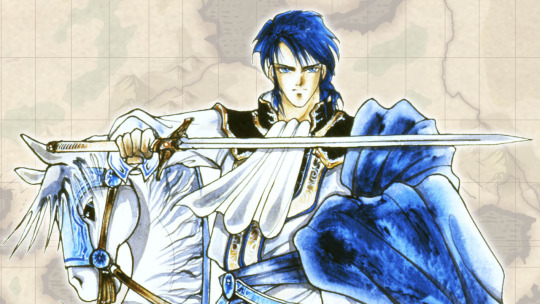
Fire Emblem: Genealogy of the Holy War Review
It took months for me to complete, but at least I can finally say that I have played this game. Of all the older Fire Emblem games (pre-3DS era), this is the one that I have wanted to play the most and whose story intrigued me the most. It is, probably, now my favorite game in the franchise, and this review is the really, really long why.
Gameplay/Story Integration
Before I even mention the story, it’s important to address the mechanics that both make this game a wonderful experience of gameplay/story integration...and make it rather annoying, depending on your perspective. This game’s greatest flaws are also its greatest strengths, which makes me glad that it was produced so long ago. I still love modern games, and most have come a long way in making the player experience much less painstaking to an annoying degree, but there is also a lot of charm in older games like Genealogy, where the player is definitely made to suffer a little.
Like all Fire Emblem games, Genealogy is about a war involving dragons, invading nations, and legendary weapons. Unlike most Fire Emblem games, this one went out of its way to make the player feel like they are embarking on a campaign across a continent, spanning multiple years of nonstop fighting and traveling. Most FE games choose to focus on one battle per chapter, with the story segments in between explaining how we progressed from point A to point B. Genealogy chooses instead to make you move your entire frontline across a HUGE map, from castle to castle, crossing distances that span countries.
It’s a unique feature of this game, and I loved it, no matter how annoying it got to lug the army from the south to the north and back down again to defend a previous position from attack. It made you feel actively engaged in the progression of the conflict, made it easy to track your journey back to the beginning and see just how far you traveled. The tedium makes it feel, in the best way a mere video game can, more realistic.
By far one of the weirder and more annoying aspects of the game is the inability for units to trade money and goods between each other. In most games, there is a single pool of money and anyone in the party who purchases an item draws from that fund. In Genealogy, each unit has his/her own money, which cannot be shared with another unless that person is a spouse or the resident thief. This does make some sense because your army is basically a volunteer army built from people of multiple nationalities and affiliations. Many make it clear they’re here to lend a hand, not join you forever, so it makes sense that they don’t all fork over their money for the army to use. Still makes this part of the game annoying if you are micromanaging the army.
It was fairly difficult getting used to this game’s mechanics, which are way, WAY different from any other in the franchise. But I value the attempts made to integrate story with gameplay (another example is the ability to fix/repair broken or damaged weapons for a price, instead of them disappearing into the ether) far more over the frustration it caused me along the way.
Story
Finally, the actual story! **Spoilers onward**
The story of this game is initially no different from any other Fire Emblem game, and it’s similar to many fantasy stories. A main character’s homeland is invaded by the bad guys, main character fights back and eventually leads a resistance force against the masterminds behind the conflict.
Genealogy turns that story progression on its head in the first half, then plays it straight in the second half. The second half is undoubtedly the weaker of the two, but it’s not bad - just not quite as interesting compared to the absolute curveball the first half throws at you.
I don’t think I’ve ever played a game that had the guts to do what this game does. The closest example is Aerith from FFVII, but at least that was one character, not the entire playable cast. This game would be devastating if it had more room to develop its characters. Honestly, it does a really good job with the limited “screentime” its characters get. Most of them are given reasons for joining that are sensible enough. The game makes sure to lay out the stakes and consequences of the choices the characters make (at least in the first half).
I think one of the reasons I like it so much is that it makes sure you feel the heavy costs of a conflict like the one unfolding in the game. It makes you feel the loss, and not only through the permadeath mechanic. Let’s be real, many players reset if they lose a unit. But even if you reset, or just are good at the game and don’t get anyone killed, the game still makes sure you see the consequences of war.
Actually, it makes you see the consequences of a simple, well-intentioned action. If makes you see how a conflict can quickly snowball out of one man’s control.
The second half of the game is, admittedly, way more typical and less impactful. The world is suffering because of the failure of the first cast to resolve the conflict, so now it’s up to the main cast’s children to finish it.
There are interesting tidbits revealed randomly and at the very end that give the story more life, so I wish they would’ve utilized these parts a little more.
Characters
A lot of people find Sigurd, part 1′s main character, kind of boring. And that’s fair. He’s a typical noble knight, very loyal and an all around good person. And he falls in love at first sight. His ultimate flaw is...well, that he is a bit too trusting or just lacks foresight.
Which is all true of our main character. But he’s also a good example of a tragic hero. His greatest strengths are his nobility and sense of justice. He starts the story only aiming to rescue a childhood friend from the invaders who have kidnapped her. But those are the same things that lead him far from home, on a campaign that snowballs out of his control and soon comes to look very much like a man working on conquering the continent, putting him in conflict with the major power on said continent who doesn’t like what he sees is happening.
He also falls into a love that will lead to disaster, so. Very tragic hero-y of him.
But I lowkey love Sigurd. I love that moment he looks back and realizes oh shit, he’s way in over his head but he literally can’t turn back anymore. The only way out is forward.
I think Seliph, Sigurd’s son, is largely forgettable. The revelation at the end, and implication that he hasn’t truly chosen his own path this whole time but was led down it was a plot point I wish was expanded on, as well as his own feelings about it all. But it kind of fits that he...doesn’t have much substance to him. In the end, he really feels like a pawn, which makes that lofty title he later gains feel all the stranger in retrospect.
This game is good at making its characters feel small in the larger setting of its world. I appreciate that.
It has a large and largely forgettable cast of named enemies and npcs. I think it helps make the world feel lived in, rather than an empty place run by like 20 people. idk, I’d rather the world feel more realistic than every named character standing out like a sore thumb.
The game gives you a lot of units, some more memorable than others. This is where a remake could really help flesh out these characters, but I felt that in most cases their motivations and personalities were realistic and believable. The downside, on the gameplay side, is that mounted units really do dominate this game. The few units on foot that stand out are the ones with outstanding performance in one aspect or another, while the rest just fall by the wayside since it can be so difficult to get them to join the action.
However, I am a boring person who loves mounted units, so. I was very happy.
Overall
As you can tell, I loved this game. It can be a bit janky in some aspects, but it’s definitely one of the more adventurous of FE games (seeing as it came out before the series really settled on a “style”). It’s not a game for beginners, I would say, given its somewhat odd mechanics that aren’t explained very well from the outset. The pacing can be feel rather long and arduous, which is on purpose, but also keeping in mind that you can save at the start of every turn - it wasn’t designed for you to bang out a chapter in a single sitting but come back to chip away at your progress.
#the muffin's video gaming adventures#now to play it in japanese!#which is an odd experience#i got so used to the fan translation haha#also all the menus are in katakana which looks so weird#modern fe games go with kanji for the menu text
2 notes
·
View notes
Text
Humor in Writing
Most of the time I feel like dismissing what might seem like “faults” in writing because I haven’t actually made anything myself, and especially haven’t gotten any attention to what I make, but every once in a while something really ticks me off. Of course, I still try to take it with a grain of salt because of my lack of true experience in writing, but considering I’m hoping to actually become some degree of a writer I feel like it’s worth actually trying to explain what I think is a fault with things and why.
There always seems to be one specific thing that bothers me a lot when reading/watching stuff, and it’s the hard switching of tone from comedy to sincerity, or something similar to that, or vice versa.
Honestly, even though it sounds like the motive of a cartoon villain, I kinda think there’s too much humor in the world. It’s probably just entirely driven by opinion and preferences, but I feel like so many people are striving and looking for comedy that it hinders so many other things. I feel like, both in real life and in writing, having so much humor everywhere creates a pretty big gap between that tone and sincerity, which is pretty much always needed at some point. The big line between comedy and sincerity makes it so much harder, emotionally speaking, to feel good about the switch. I’ll try to explain…
First of all, this whole line of thought, even though I’ve been thinking it forever, was spawned by me watching Epithet Erased. Took me long enough, because I’ve seen some of the characters around and really loved their designs, but I finally watched it all, and I gotta say… It was interesting. Also, this is probably just going to be very ranty and opinionated but I will (hopefully) have something more valuable to say after. But, anyways, for one, it felt just barely too close to some of the premises for the stories I’ve thought of in various ways, but I guess that’s just bad luck on my part. Second, I feel like its humor really brought it down for me. Some episodes felt so long winded (although not necessarily “boring” I guess) because I felt like I got the joke they were trying to tell relatively quickly after they started it, but carried it so far. It didn’t help that, at least for a few of them, some of the characters felt like archetypes that I’ve seen a lot around the internet, or at least were simple enough that I understood what they were instantly, and when they are carried out through long character-focused moments it felt like nothing was happening. I feel like some of the characters are fine enough, even if I may not like them, but Giovanni and Indus were the two big ones that I thought had a little too much time given to them…
But more relevant to what I’m trying to say, sometimes the writing jumps way too far from the very comedic tone it’s trying to put out and into it trying to be sincere. The worst case of this was when Sylvie met Mera in the museum storage, and Sylvester tried to out Mera’s nightmares, only to see that her nightmare was the reality she was already in. With the scene change, and Indus becoming more serious with Molly, it felt like a good enough departure from the usual comedic tone to warrant the deeper motive of the character. But, then, of course, they had to trash the whole tone by adding the line about her also being afraid of ducks. There was absolutely no good reason to warrant that line and I will die on that hill. Not only was it just humor, but it was spontaneous “random” humor, and so on… I honestly hope people could just understand where I’m coming from there by how out of place it seems. I feel like the only defense they could use, apart from “just liking it,” would be that it’s comedic relief, but I genuinely feel like since practically the whole thing up until this point was comedy there was absolutely no need for comedic relief. The scene itself is like the opposite of comedic relief, like “Sit down and pay attention” or “Turn your brain back on” or whatever. The climactic point of the scenes before it were reached, meaning the sincere conflict there should be focused on, and apart from that one tiny little line it worked well enough. The fact that it was so tiny and insignificant is basically why I hated it so much. They literally could’ve just scratched it off of the script and only good things would have happened.
Something a bit similar happened before when Molly revealed her backstory to Giovanni. It wasn’t quite as bad, but when a scene goes from comedy to “my mom’s dead and my life sucks” you do feel the shift a little too quickly. I feel like it’s not as bad because it could just be Molly’s character, seeing the tragedy of her life as just sort of normal and not really that remarkable, meaning she’s more likely to just randomly bring it up.
But I definitely wouldn’t be going off this much about it if there wasn’t at least a little bit more. Zora was literally the reason I wanted to watch the show, because I saw a drawing of her a while back and thought she was just some random OC, but when I heard she was from this show I instantly wanted to watch it a lot more. I think the same thing happened with Molly, but I think I knew she was from the show to begin with. Anyway, Zora was the main character who I loved from the get-go and loved even more the more I learned about her. She’s such a perfect amount of diversion from being a generic cowboy in the little design details, while still being 100% cowboy material. Then, when I saw that her power was “Sundial,” or more generally just time powers, I loved it. The big thing that seems little conceptually is making her key term “sundial” instead of just “time” or whatever, because of how much it relates to her cowboy-ness, with it being associated with the “sun” people often associate with Death Valley and the Wild West and whatnot. Not to mention, it’s just a cool power.
But that’s kinda the thing, though. She’s so insanely strong. She could literally kill anyone on a whim. I don’t see how anyone could be cracking jokes in her presence. It’s kinda more general of a gripe, but when she aged up Howie it was borderline terrifying, and yet… right after, they’re cracking jokes again. It’s just so jarring. She could have literally reduced him to dust, and they’re so casual about it. I know Percy is supposed to be kinda blind to some obvious things, but I feel like even she could see the horror. That said, though, Percy is also one of my favorites. Her powers feel so natural yet interesting for what she is for some reason.
Frankly, the visual character designs alone for this show are all really good. Whether or not I’m into the writing, I can’t deny that the show kept me coming back just because it feels so good to just look at it, you know? The minimal animation, vocalized stage directions, and top-down scene view was really interesting to watch, since I’ve never seen it before, and seems like a perfect way to produce more content with less budget. It made everything feel super crisp and tidy, despite being animated so simply. Not to mention that the general lack of animation meant the few scenes where there was traditional-level animation felt really good. The voice acting was also amazing, (again not directly tied to the writing) especially when the voice actors carried their character and emotion from the scene into the stage directions, instead of just reading them out plainly. And, at the very least, the premise of the show is also really interesting (at least to me, mainly because I created 2 stories with a similar idea without even knowing anything about it. Simplified, specific superpowers are just perfect for character designing, you know?)
But I am kinda acting like the writing was bad, but it really wasn’t all things considered… I’m just not really into comedy, and when the comedy I don’t like is paired with writing and practically everything else I do like it doesn’t sit right with me. Considering this idea and some of the story beats were adopted from a DnD(-esque?) campaign, I feel like it’s much more fine. Frankly, I’m surprised I didn’t realize it sooner. Once I read about that, everything just fell into place. I’m not really into DnD either, though…
So, I feel like there are things to gain from thinking about this. While Epithet Erased is still on the mind, I feel like I’ve realized something about the juxtaposition of comedy and sincerity, that being that comedic characters can exist in sincere surroundings, and vice versa. Zora specifically could be one of these characters, because she’s so powerful that she probably sees everything around her as trivial, while the other characters have more sincere reactions to her obscene power. She could easily crack a sick joke that no one laughs at because she’s the only one who can find humor in whatever’s going on. By contrast, the thing about Mera’s fear of ducks was a product of the scene and not of the character, so it just ruined things. Nothing about it was made to be funny to the characters, it was made to be funny to the audience, even though the audience should be in sincere mode then.
Another character that I think works like this is Charlie from Hazbin Hotel, who is the sincere personality in a world of complete and total insincerity. She’s basically a more unique kind of straight man (despite being neither straight nor a man), who are always the grounding in comedic casts, like Squidward in Spongebob. I guess in sincere stories there are comedic relief characters, and in comedies there are straight men. You know, these are probably all things other people have figured out already… at least I can feel good knowing I sort of reached them on my own…
I think a good solution for stuff that’s primarily meant to be a comedy is to make it almost entirely comedic, at least with the inclusion of a straight man if needed. The big name that comes to mind is good ol Monty Python, the backbone of 14 year old boys’ humor style. At some point I realized why I like the humor of The Holy Grail, at least above other comedic movies, is that they don’t hold back at all. At no point whatsoever do they pull back the veil and put in a sincere moment. And, of course, since I can basically recite the entire movie from memory I think it did wonders. I think when it comes to comedies like this, trying to be too sincere at certain points makes it feel even less sincere than if it didn’t have the sincere moment at all. This might be a product of the 00s American family-rated live action comedies who all feel like they fall into that same boat, where the entire movie is hijinks, but then at the very end they pull that all back and have something really impactful happen, with the idea being having some shoehorned message about “family” or whatever. I can group so many movies into that category that it feels almost corporate how many there are like that, and because it’s both overdone and geared towards too generalized of an audience, trying to capture the comedy-lovers and sincere-lovers, it really just fails in both ways. Or, maybe people love them because they’re just barely bad enough to enjoy it in a so-bad-it’s-good sort of way. I dunno. If I wasn’t a little nostalgic for the time those types of movies might be my all-time least favorite.
But I’m a stick in the mud who hates comedy so I’m not really equipped to tell anyone how to do it right. Instead, I feel like there’s some seriously untapped potential in other forms of “feel-good” tones, like casual lightheartedness and just plain fun. I feel like those two things really work towards creating sincere stories that are still enjoyable, and not just one shot of sadness after another, while still having a dash of impactful emotion in them.
I feel like this is where Pixar really shines. People say “It’s not a true Pixar movie if you don’t cry at the end” because I think Pixar movies are great at making the audience lower their guard, and when the moment is right, hitting you right in your heart to make you feel the right emotions. For example, what I’d call my favorite movie of all time (for intents and purposes, if not for real), Inside Out, is all about emotional sincerity, where it’s trying to get across how it’s okay to feel sad, even though the world around you tends to say happiness is always what you want. For most of the movie, it’s a pretty casual romp around the inner workings of Riley’s mind, with some jokes thrown in (because it doesn’t have to be completely without jokes). I’m not really sure how to explain it, but the various jokes in Inside out feel like they’re sort of blended with the interesting workings of this fantasy mind-world, like the fact that earworms are just the little blobby workers in our minds sending the memory of the song back up to the control panel for the hell of it, or that our dreams are a product of a Hollywood-like place in our minds. These things definitely are there for humor, but something about them feels much more fun than just any kind of generic comedy.
Then, I feel like the most important thing about fun and lightheartedness is that they feel like they blend so much better with the sincere moments. Obviously if it’s too quick it’ll still be bad, but I think it’ll be much less bad than with comedy. Maybe you could think of it like a spectrum with pure comedy at one end and pure tragedy at the other, with fun and lightheartedness just barely crossing the midpoint towards the comedy side. Since there’s less of a gap between it and tragedy compared to pure comedy, it feels less jarring. Plus, it just feels more reasonable logically speaking, since comedy sort of puts up this insincere barrier to sort of suspend the disbelief that the events in question are supposed to be taken seriously, which makes breaking that barrier harder once it’s established. With fun and lightheartedness, there may be an expectation of it sort of maintaining itself but there isn’t as much to say there isn’t something hiding in the background. In Inside Out at least, throughout Joy and Sadness’ journey they are pretty determined to get back to the control panel to save Riley, but they’re for the most part confident they can do it (or, you know, just Joy’s confident), so they sort of interpret the world around them in a more casual light, but with that lower-level need still there. But when Joy falls into the abyss of forgotten memories and the hopelessness sets in, you feel it much more, because it was sort of already there to begin with, and it was just made perfectly clear at that moment. I think Bing Bong’s emotions during the scene also make it pretty emotional, since he’s being casual about his death while also being sincere about his sacrifice for Riley’s sake. Not to mention his inner sadness was outed while talking with Sadness.
I feel like if I were trying to write an actual essay I could probably phrase all this a lot better. I just think there’s a ton of value to lightheartedness in stories, as opposed to comedy, for the sake of “feeling good.” Pretty much all of my favorite things have that tone to them to some degree, like Wander Over Yonder, my for sure favorite TV show. It definitely feels fun in a way that can elicit laughs, but it’s not a lot like “This is a joke and you should laugh” most of the time (Disregarding the Evil Sandwich, my least favorite character in the show). I also think Steven Universe succeeds very well with that tone, creating an extremely comfy atmosphere when it comes to the less climactic episodes.
I also vastly prefer the lighthearted resolutions to the conflicts in lighthearted stories. Frankly, I am infinitely more likely to cry to a comfy and happy resolution than I am to the actual sad parts. I’m not really sure what it is about them, but I guess the characters finally being happy again after emotional turmoil warrants a happy-cry. I swear, if I think too hard about the scene where Riley finally admits her sadness to her parents and just sits in their warm embrace, I tear up. It feels so much better than hijinks-danger-hijink resolution.
But yeah, the stories I want to write the most will all inevitably have that sort of lighthearted flair to them, unless of course I choose to go more inherently serious with a story. There’s nothing wrong with that either.
With regard to the really big claim I made before about there being too much humor in the world, the themes of Inside Out, and what I said about comedy’s insincere barrier, I really think the world as a whole would benefit from valuing humor a little less. It feels like there are so many situations where people sort of want to maintain their good feelings with humor instead of more directly dealing with issues in a sincere mindset. For example, if people say something disagreeable (but not insane), It feels like too many people resort to making jokes at that person’s expense and not dealing with the issues directly. Obviously if someones saying some insane bullshit it’s fine, but when the more reasonable takes that are just barely put under the same umbrella as the insane shit are made fun of, it really deepens the trench between the people of different opinions. Of course, humor isn’t the only thing deepening that trench, but it really feels like one of them a lot of the time.
Apart from that, I feel like using humor as a way to distract from general negativity and negative emotions like what Inside Out sort of warns against can be pretty detrimental too. Obviously happiness can still be around, but putting up that kind of barrier between you and the necessary sincerity for emotion with comedy just makes the unpleasantness of the unpleasant stuff that much more unpleasant. I’m saying this one at least out of personal experience, since I have sort of developed to be too subconsciously against super sad and sincere real world scenarios. I haven’t personally felt too many of them myself, but I definitely feel myself blocking off some of my own emotional vulnerability, especially around other people. I can consciously talk against it, like I’m doing now, but I feel like it’s going to take a long time for that barrier to really break. Is humor to blame for that sort of thing? Maybe, with a dash of toxic masculinity and other buzzwords people often avoid for reasons I mentioned in the last paragraph.
Even though this one is much more unreasonably generalizable than the last two things, I feel like the popularity of self-deprecating humor across the internet also (probably?) takes a toll on some people. Obviously some people might just use it to their genuine benefit, but since it seems so common surely some people are putting on a self-deprecating face to get along, and eventually maybe even believing what they used to joke about themselves. Either way, it might be a product of an extreme departure from any kind of narcissism, making being self-confident and self-loving just that little bit harder for people.
But, while I’m not the most equipped to judge writing, I’m even less equipped to actually debate for the existence of all those things, so just know I’m kinda speaking with my heart and not my brain here. People obviously want and need different things, and I’m probably just projecting. Hell, maybe that’s me self-deprecating to not make me seem weird to everyone else. I dunno.
No matter what, all this reliance on humor really just shows who is and isn’t funny. Sometimes, people really need to get a grip. Frankly, I don’t think I’m that funny either, which is why I’ve kind of had the humor beaten out of me by one too many awkward silences after a weird joke in my elementary/middle school days. I guess that’s my cartoon villain origin story.
5 notes
·
View notes
Text
The story of Pidge or Dark Youth as the main character
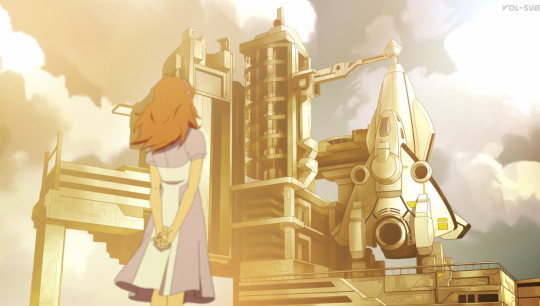
Translated and edited by @Nadezhda932
First warning: Plance
Second warning: before reading this meta, I strongly advise you to read the previous metas about Lance and Pidge. Because I won’t repeat the thoughts expressed there, but I will refer to them.
Not so long ago (at the time of writing), a 200th Let’s Voltron podcast took place, where the voicers gathered together and remembered the glorious past when they voiced the series together. And Bex – the voice of Pidge – remembered Plance and compared it to a wonderful little garden. Naturally, this led to the beginning of the discussion, where we analyzed the characters and their interaction with each other. And the idea came up to try to pull the Pidge storyline on Heroine’s Journey. Well, I mean to try to check whether there are those necessary components in her story that allow us to say that yes, this is the real Heroine’s Journey. And, to my pleasure, I suddenly realized that the story arc of Pidge really suits these requirements, and it’s even more interesting in its nuances than the Journey of Allura. Why? Because Allura has a classic story – a girl must become more confident in herself, go against society, save her prince, defeat the evil queen, etc.. Pidge… her situation is the opposite. And I’ll try to explain why.
I’ll begin by describing how the attempt to “pull” the story into the stages of the journey actually takes place. To do this, you need to determine that the storyline of the character doesn’t consist of separate episodes, but has a single common outline that runs through the series, and find several important components in this outline:
A) The drawback of the main character, preventing her from gaining inner balance and harmony;
B) The lowest point of the Journey. The moment when the heroine realizes this shortcoming and begins her work to fix it.
These two things also make it possible to determine what becomes an imaginary reward for a heroine and what becomes a real reward, and thus we begin to perceive individual scenes with the heroine as a single construct – a story about self-digging, which is the Heroine’s Journey.
And the main drawback of Pidge is not only her egoism, because there are a lot of happy egoists in life. The main disadvantage of Pidge is the zero ability for social interaction that developed as a result of this egoism.

As well as an absolute lack of understanding of what is “criminal liability”.
The Holts adored their daughter with blind love, were proud of her mind and indulged in everything, and thereby served her very evil service, because the parents should not only love their child, they should prepare the child for adulthood and set the right moral compass. And, alas, Pidge has serious problems with this. In the series, she appears as a brilliant teenager, but at the same time lagging behind in social development. Not because she’s mentally ill, but because she grew up in an environment where that metaphorical muscle responsible for social skills simply wasn’t trained.
Honestly, there are not so many ideal parents in the series. These are the parents of Hunk and Dayak, who performed a miracle, having managed to raise a mentally healthy person in an environment that clearly didn’t contribute to such a development of events. The classical educational school of ancient Daibazaal showed a real master class, and it’s a pity that the main characters cost only an orientation course.
The Pidge’s storyline isn’t the main one in the series, but it’s important enough to make an integral picture of her behavior if desired. You need to understand that social interactions are not just “hello – bye” or “let’s be friends against a common enemy” – I would even say that in such situations, skill isn’t required. The skill of social interaction is necessary in order to join the society where you’re only a drop in the ocean of people, and to learn how to live in it, avoiding conflicts. This is the ability to please, and the ability to circumvent sharp corners in communication… and this all needs to be learned. A person isn’t born with these skills, they learns them in the family and in society, and … by the age of 14, Pidge didn’t possess these skills. She often behaved rudely with others, if not boorishly, completely ignoring the status of these people, and this can no longer be attributed to a simple straightforwardness of character.
You may ask: where did all this come from? It’s easy to imagine.
Pidge had greenhouse conditions at home. Parents loved and understood each other and pampered their beloved daughter. The brother was much older, and Pidge didn’t have to be jealous or fight with him for a favorite toy. In addition, the Holt family was united by a love of science and lived, as they say, on the same wavelength. The absence of conflicts and acute angles in the family is wonderful, but alas, it doesn’t at all contribute to the ability to solve the conflicts and circumvent acute angles.
Another teacher is the surrounding society. The child looks at this society, observes and begins to repeat. The child tries to communicate, with alternating success, and draws certain conclusions from the result. And the problem of Pidge is that all her conclusions boiled down to the fact that “they love me because I’m special and smarter than all of them.” She considered herself the smartest and didn’t strive at all, not only to observe how others communicate, but also to try to adapt herself to other people. She didn’t hesitate to interrupt the teacher and make her incompetent, although at the age of 14 you can already understand that this is simply ill-mannered. Moreover, judging by the behavior in the classroom, it wasn’t the first time she acted in this way, but which is characteristic – none of those present was imbued with respect for her knowledge. Because social interaction doesn’t work unilaterally. You can demand only for submission, respect or acceptance is always a two-way work.

Pidge didn’t even realize that she was doing something wrong. She sincerely shared knowledge…

…but you must also be able to share knowledge, so as not to make yourself an arrogant pride.
And the problem is that the Holts didn’t attach any importance to this. After all, they also believed that “Katie is just a special and brilliant girl, and this civilians aren’t able to understand her because of their earthliness, but when she enters the Garrison …”. She entered the Garrison, so what? Her environment consisted only of extremely condescending and patient people – Hunk and Lance, and she rejected their friendship at the first meeting.
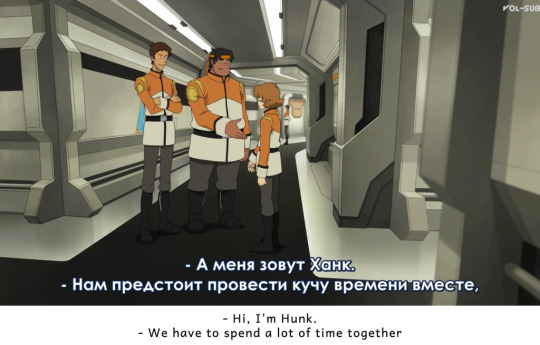
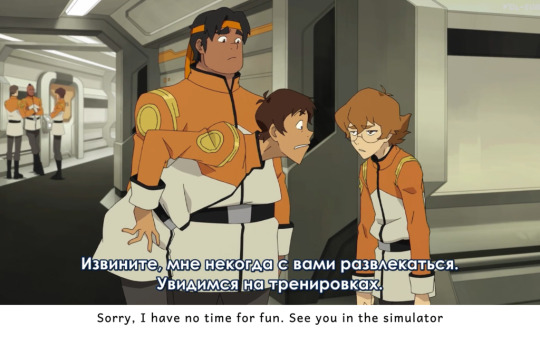
You see these people for the first time and don’t even want to spend a couple of minutes getting to know each other.
School is that litmus test that shows how the child will get along in society, and you can’t turn a blind eye for the fact that your child isn’t accepted in this micro-society. You need to work, you need to try to understand what’s wrong, and keep in mind that the problem can be not only in evil peers, but also in your own child, who is an innocent angel only for you.
Because a person is a social animal, and we have a psychological need for respect and recognition. While Pidge was a child, she was fine with her parents, brother and dog, but now a new adult life is knocking on the door, where she wants something more. She’s already 14 years old, even though psychologically she’s 11-13 years old, but she’s already a teenager. And she has a completely positive example of a motherly figure – successful professionally and in her personal life, and she probably wants the same for herself.

Nothing prevented Colleen from being both a brilliant scientist and a charming woman at the same time.
Moreover: Mrs. Holt has a short haircut, which means that having long hair is a personal desire of Pidge. Yes, she doesn’t get along with other children, but she tries to wear beautiful dresses and looks after her magnificent hair. She doesn’t say it out loud, but she clearly feels the need to be accepted not just as a child, but also as a young woman.
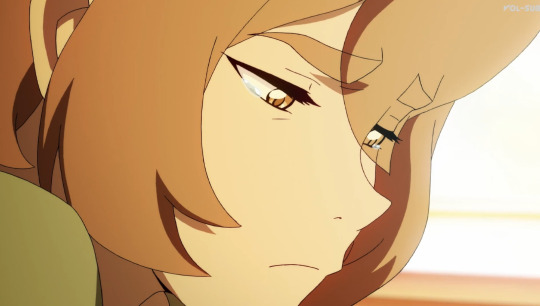
And she feels upset when she can’t get in contact with peers.
And here your parents won’t help you.
Yes, mother can say a hundred times that you’re beautiful, but this is not the same as the approval of your friends and the attention of the boys. And Pidge had problems with this, because she pushed peers away and couldn’t even get respect from them for her intellect and knowledge, which, with different behavior, could earn the approval of the teacher and admiration from other children. Because social skills in society are like traffic rules in a stream of cars. You can be a brilliant driver, but you will still be cursed by others if you turn without turning on the turn signal, or if you don’t miss a pedestrian.
But to solve a problem, you need to know about its existence. You need to understand that it’s here, and you need to solve it. And since her beloved relatives assured that everything was fine, Pidge didn’t realize what was wrong until she faced the real consequences of her actions. And this is exactly what the Heroine’s Journey tells. Moreover, the Journey of the Dark Heroine, because Pidge is the real Dark Youth, traveling in a group of the main characters of the series.
It’s actually not so difficult to distinguish Dark Youth from Light Youth. You just need to look at what’s the main motive for a person to start a journey. Allura traveled for the desire to become the winner of evil, Lance – for the recognition of loved ones, Pidge… for her selfishness. Yes, because her love for relatives is very selfish, and we can clearly see how she treats the love of her relatives in a consumer way when she easily abandons her mother to regain her “property” – her father and brother.
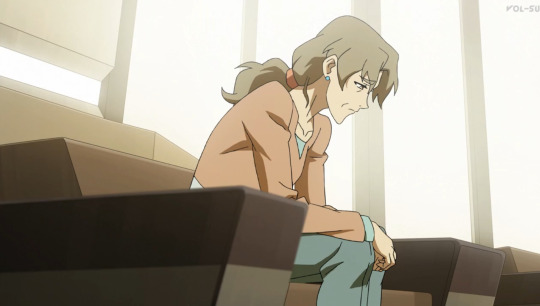
Look at this poor woman. How she got older, how her hair grew – having lost her children and husband, she even stopped monitoring her appearance. But what does Pidge think about in S7 when they prepare to return to Earth? About how she’ll be punished. She doesn’t think about WHAT her mother experienced during all this time. Sorry, but for some reason I’m not too lazy to call my family at the age of 30 and say that everything is fine. And Pidge isn’t a toddler or even 10 years old to behave in this way.
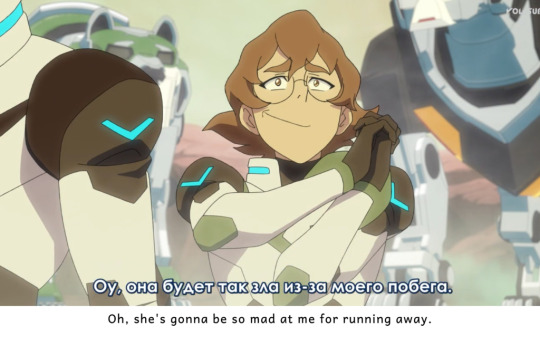
But if Pidge is Dark Youth, then who is our Light Youth and where is our Animus? And here we get a very interesting point: the fact is that the series forms a whole bunch of heroes, where one character has two Dark Youths at once, and the other has two Light ones.
And these ligaments look like this: Lotor-Allura-Pidge and Allura-Pidge-Lance. Funny huh? A sort of love quadrangle.
In the case of Allura and her Dark Youths, the question arises of contrasting the common good and personal desires. Lotor and Pidge are two opposing sides of personality development that pull Allura like a rope in a competition.
Lotor is not just the Dark Youth of Allura. He’s an allusion to her ideal, to which she aspired. Lotor is not a teenager with personality problems, no, he’s a mature – even old – man. He’s a great diplomat and speaker, he’s polite and ready to compromise with everyone, but he never trusts anyone, because he’s constantly stabbed in the back. He’s ready to sacrifice all desires and affections for the fulfillment of the plan for the salvation of the universe, which he once set for himself. He’s confident in himself, he knows what he’s doing, he calculates everything in advance, but at the same time he improvises very well. An ideal politician and strategist with the most noble intentions. And he’s not a friend of the Alteans, not a commander or a king, but the Holy Savior Lotor. An example to follow, who took the cross upon himself – to atone for the sins of his father – and carried it, pushing aside everything personal for the sake of the greater good. He doesn’t allow himself to be angry at people or become attached to them, because all this can ruin his important mission.
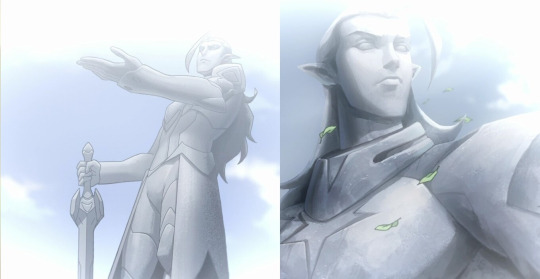
So perfect and lifeless…
This is what Allura’s dream of becoming a ray of light for the universe could turn into. Nothing for yourself – everything for others. A lifeless holy idol who has long forgotten about love and personal wishes. The Alteans with their cult of sacrifice will fully approve it.
And Pidge really turns out to be his complete antipode.
Lotor is old, she’s almost a child. Lotor is polite and eloquent, she’s straightforward and often rude. Lotor doesn’t trust anyone, she completely believes her loved ones. Lotor acts for the common good, Pidge – exclusively for personal purposes. Lotor turned his back on his family, because he considered their actions immoral, Pidge fully and completely supports her family, no matter what happens. They can only be united by confidence in what they’re doing is right, but this is not much in which they agree.
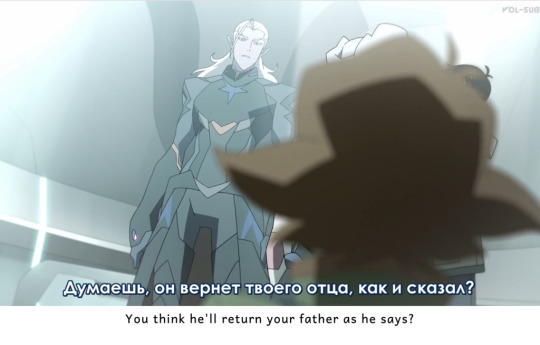
An ancient man who wants to save the universe and a little girl demanding to return her dad.
And this pulls Allura in different directions – the dream of serving others and her own desires. None of it can be put on a pedestal, as the path of Allura is the path to a balance between these two aspirations. In the end, it was for a reason that Lotor reached out to her – the lifeless Saint figure really wanted to feel alive again, to love and trust someone. The savior wanted someone to save him.
Pidge’s parallels appear a little different. They say that all families are equally happy, but each suffers in its own way. And how much Lotor and Pidge differ in the role of Dark Youth, so much in the role of Bright Youth are Lance and Allura alike.
The Red Paladin, which should be Blue, and the Blue Paladin, which should become Red. As brother and sister, they go hand in hand in their insecurity, albeit regarding various aspects of life.
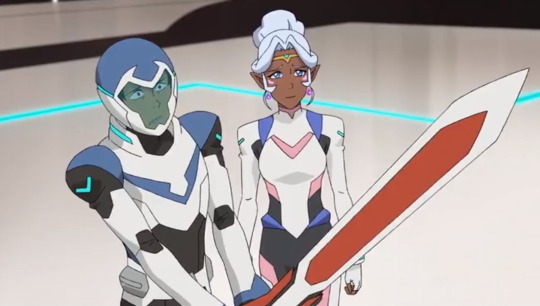
And you know, it's funny when you think that the Blue Lion is the right leg and the Green Lion is the left arm. Indeed, opposites.
I've already written about Lance and Pidge. Here I will say that the question of Lance and Pidge's relationship is a question of selfishness. Lance and Pidge both wanted public acceptance. But if Pidge, in pursuit of her family, abandons the idea of establishing contact with others and achieves her goals through conflict and breaking the rules, then Lance, on the contrary, goes out of his way to achieve what he wants, almost pursuing people in attempts to get attention from them.
Funny contrast: Pidge completely neglects her appearance at the start of her journey, while Lance is the only one on the show who takes the time to look after his appearance even in the middle of a war. Beauty is one of the most affordable ways to gain recognition. And if Pidge refuses even it, then Lance clings to attractiveness with his legs and arms, considering it a measure of a person's level of happiness.
Lance is a very compassionate selfless person, but in pursuit of status, he went against his own nature - he began to consider loved ones from a consumer point of view. And crossing with Pidge on this subject should have made him stop, take a look at himself and what he was doing. Take a look and think about it at last.
On the other hand, Lance is also a subject of interest. This is a childlike innocent affection that Katie developed towards the end of the story. Lance may not be the most attractive man, but he's an open and cheerful person who gave Pidge exactly what she lacked in school - sincere friendship and acceptance with all her flaws. Katie is still quite small in this regard, this is not some kind of serious romantic love, but this is a strong feeling, which over time, over the years, can turn into something more mature.

Having fun with friends is what Katie has dreamed of since school.
He is Pidge's Animus. A person with similar problems, but with the opposite approach to solving them.

It’s interesting that at the beginning of the journey it was Lance who didn’t notice until the last moment that Katie was a girl.
Everything is a little more complicated with Allura: Allura doesn’t appeal primarily to Pidge’s egoism, but to social skills. Yes, the idea of sacrifice is close to Allura as an Altean, and it is opposed to the egoism of the Green Paladin. But the main thing is different: Allura is polite, educated, diplomatic and, in the end, accepted and loved by society as an amazingly beautiful woman. And this is what Pidge would like for herself, without even realizing this need. On the other hand, Allura’s professional skills are forgotten by S8, those around her begin to perceive her only as a pretty alien girl, against the backdrop of the triumph of Pidge, whose ingenious mind is recognized in the professional circle of scientists.
And if Allura in the changed S8 turns into a damsel in distress for a noble knight who will worship her like the Virgin Mary, then Pidge becomes that very caricatured strong and independent woman, only instead of 40 cats she has robots. It’s caricatured, because it’s the image of a woman who declares that she doesn’t need anyone, and then, in longing for human warmth, she turns herself on to a pet in order to sublimate her psychological needs. In the case of Pidge, she builds herself a metal brother. And in ten years she’ll also build a metal lover, why not.
The truth is that a person is happy only when they realize themselves both professionally and personally. There’s a huge number of people who put their lives on the altar of some important mission, but later not so much of them could call themselves happy. On the other hand, there are a lot of women who abandoned their ambitions for the sake of marriage, and then regret it until their death.
So what is it – Pidge’s Heroine Journey? Let’s look at it in stages.
Stage 1 – Separation from the feminine.
Pidge is a teenager of 14 years old. She has problems with her peers, she can’t find a common ground with them, and therefore clings to her family – her cozy mini-world, comfort zone. But here a tragedy occurs: father and brother disappear on an expedition. Pidge finds out that something is unclear in this case, but the father’s authorities refuse to explain the situation, and she decides to find the answers in a not too legal way – secretly, despite all the prohibitions.
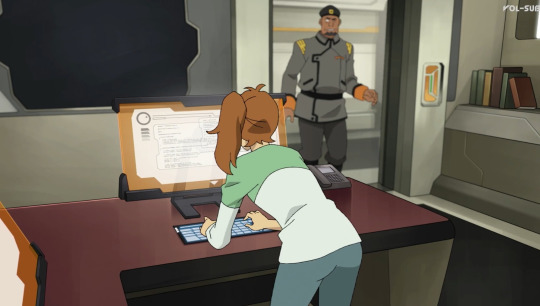
Feminine figure and beautifully decorated room…

…all this was left in the past.
This is very symbolic: Pidge leaves her mother alone to experience the tragedy and cuts off her hair – a symbol of her femininity.

Katie is not at all happy to lose her beautiful curls
Stage 2 – Identification with the masculine and gathering of allies
Pidge studies at the Garrison in the company of Hunk and Lance, hiding under the guise of a homely boy. At first she repels them, but since they’re a team, she has to communicate with them. But instead of making friends and learning to communicate, Pidge spends all her efforts looking for information about the family. Meanwhile, she begins to have confidence in Hunk and Lance, finds common interests with them, and gradually these two in her eyes pass from the category of strangers into the category of the ones whom she can even tell her secret.

And when Pidge once again can’t keep her mouth shut…

…it’s Lance who protects her.
Stage 3 – Road of trials, meeting ogres and dragons
Shiro's return and the beginning of their journey. Pidge grabs any lead to find her father and brother, and is even ready to give up everything and everyone for the ghostly opportunity to save the family. On the other hand, one way or another, she begins to become attached to the people around her. True, this attachment is selfish. Pidge worries about the safety of her friends, but she isn't interested in what they grieve and worry about. Her fixation on the family is in stark contrast to the fact that the main leadership backbone of the team - Allura, Shiro, Keith and Koran - are orphans who have no loved ones except for each other and a common cause.

Keith with his desire to save Shiro is certainly disingenuous, but he described Pidge's problem correctly...
Stage 4 – Finding the boon of success
Pidge finds her brother and saves his father. But at what cost? The height of selfishness is to send a person to certain death, without even trying to give him a chance for being rescued. And personally for Pidge, this person is only to blame for the fact that he's not included in the circle of her loved ones - the circle of those whom she considers her "property". But she still gets her way, she saves her family, without any remorse. And then she has fun with friends who have already become family members for her - part of that very micro-world.

And it was during this period that Pidge appeared in the game as the most closed character, fenced off by armor from other people.

And the mess in her room as an indicator that Pidge wasn’t going to invite guests at her place…
Stage 5 – Awakening to feelings of spiritual aridity; death
Homecoming. As people say, be careful of what you wish for. Pidge constantly tried to leave friends and other people behind, in the pursuit of saving the family; as a result, when she returns home, she’s grounded. Now, her circle of loved ones is forcibly composed only of her parents and brother. Moreover, the most annoying thing happens: Lance invites Allura on a date. Lance complained to Hunk for several weeks about being unworthy of Allura, while Hunk listened sympathetically. And there was no one who could interrupt the flow of this whining, because this someone was sitting at home. As a result, Hunk persuades Lance to go out and invite Allura on a date, and she unexpectedly agrees.

And after so many days of isolation, Pidge is free only to find out that Lance is going on a date with Allura. Pidge liked Lance, she even tried to compliment him, although unsuccessfully – and now he sailed away to a beautiful princess, and Pidge could only watch this process.
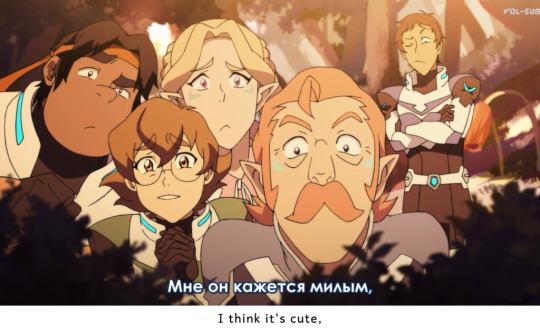
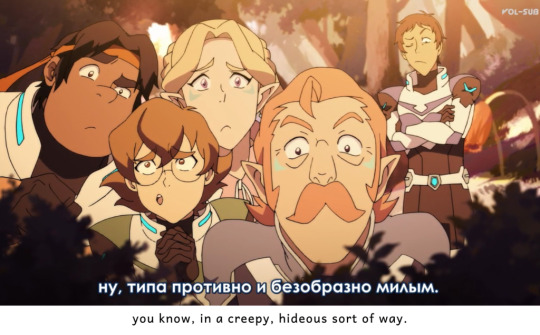
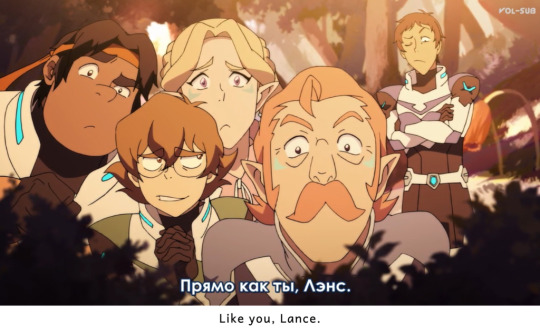
A scene called “She tried”.
She even helps to arrange this date: to get Allura the dress for which she gives the game – the subject of their common interest with Lance. But that’s where her altruism ends: she doesn’t stand it and decides to follow them, because until the last she hopes that Allura will refuse Lance, but this doesn’t happen.
Yes, Pidge is respected as a scientist, but how much does it mean if the person dear to her, whose attention she values, is now fully devoted to his new girlfriend? You can say as much as you like that they’re a team of paladins, but we know very well that couples are always a little apart, as they feel like spending time together.
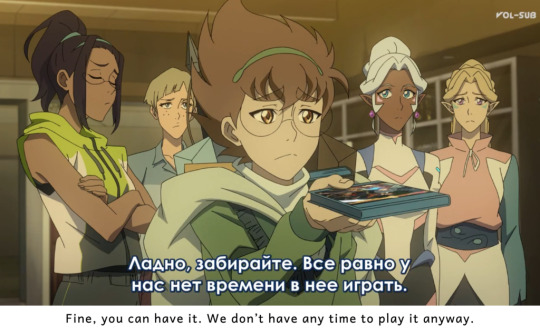
And Katie knew perfectly well that now Lance is unlikely to find time to play with her.
Stage 6 – Initiation and Descent to the Goddess
Here’s a difficult moment. The fact is that this moment takes place in S8, in an episode that was originally intended for S7. And I can’t help but wonder if it should have taken place in the earlier version of the script, because according to the logic of the travel, Pidge should have it. This conversation takes place in a dead forest, where Pidge and Allura are left alone at some point, and Pidge, who saw how Allura saved the tree, asks if she can help Olkarion. After this, Katie has to admit that yes – she followed them, and naturally the question of Lance’s feelings will be raised.
Allura is Pidge’s Light Youth. She agreed to a date with Lance out of feeling guilty and out of gratitude for his concern. Her consent is pure sacrifice, altruism. And she admits it while talking to Pidge. That yes, she doesn’t have feelings for him, but he loves her. Remember the first episodes, where Pidge confidently says that a princess in her place would do the same. But now she sees that Allura, on the contrary, is ready to sacrifice the personal for the sake of someone else’s good. And this makes her think, because Lance chose Allura.
Throughout the series, Pidge was not very friendly with the princess. When Allura found out that Pidge was by no means a boy, she was the first to welcome Pidge as a girl, because having only men in her social circle wasn’t very comfortable for a girl. But then Pidge kept in mind only the search for a family and simply didn’t understand that she was offered girlish friendship. But now, in this situation, Katie was the only one to whom Allura entrusted her “female” secret, and the Green Paladin saw her tragedy and in some ways even managed to share it. Pidge saw in her not a rival, but a person who had lost absolutely everything and was ready to sacrifice the little that was left of her.
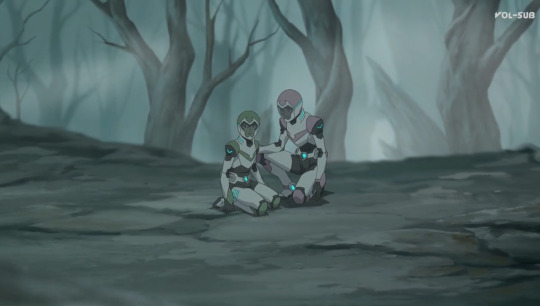
You know, at the first meeting with the Olkari, Pidge says that she’s very far from nature, she’s closer to technology and robots, to which she doesn’t need to adapt. This can be considered a metaphor for how she pushes living people away from her, how she turns away from a simple human desire to realize herself socially.
And it is very symbolic that the bottom point of the journey occurs precisely in the middle of the dead Olkarion.
Stage 7 – Urgent yearning to reconnect with the feminine
After talking with Allura, Pidge begins to look at the situation in a new light. She’s still upset that Lance is now devoting all his time to his new girlfriend, but now sees him not as an “escaped property”. Now for her he’s a really unhappy guy deserving of support, not ridicule. She generally begins to reconsider her position towards people, although this is a very slow process.
When they leave to celebrate Clear Day, she leaves her family — which she saved with such zeal — for the sake of helping Lance get a present for Allura. For the sake of the opportunity to stay with a loved one and find a gift for his girlfriend. And she sincerely seeks to please Allura, because she really imbued with sympathy for her. And when Lance tells her how useless he feels, Katie tries to support him, inspire, and somehow help him solve the problem of relations with another girl. And for a spoiled egoist, this is a very serious step towards change.
By the way, did you notice that in Clear Day episode there’s not a single scene of the interaction between Pidge and Lance, although Katie knows from somewhere that Allura asked for a present? It was cut out while editing S8.

What kind of torment would you go for friends?
Unfortunately, I can only assume what the next steps should look like, too much has been cut.
We know that Allura will decide to announce to the paladins that she’s going to save Lotor, and perhaps Pidge will be the second after Lance to support her in this. Maybe she will even play a role in ensuring that the conversation between Allura and Lance takes place.
She will be next to Lance after the return of the prodigal prince and will morally support him. Perhaps they will even play the game as they dreamed in their podcasts. They’re still children who are just entering adulthood, and after everything they have experienced, they must find a place for joy.
In addition, Pidge has guilt before Lotor, and after her selfish behavior it’ll be important that she realize this and apologize. In general, this will be a lesson for her: a lesson in acknowledging her wrong, and a lesson in humility. The beginning of a long journey of working on oneself, which will allow Pidge to finally realize herself not only professionally, but also personally. It’ll allow her to stop repelling the world, accept it, and learn to swim with everyone in a single stream of the river called “life”.
After all, green is the color of life. As well as blue.

14 notes
·
View notes